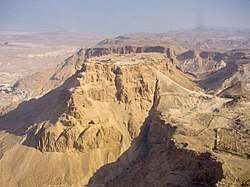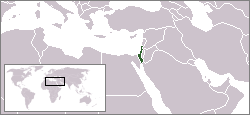Israel
The State of Israel (Hebrew: מדינת ישראל; Arabic: دولة إسرائيل) is a small yet diverse Middle Eastern country bordered by Egypt and the Gaza Strip to the southwest, by the West Bank and Jordan to the east, and by Syria and Lebanon to the north. The country has a long coastline on the eastern Mediterranean Sea, and very limited access to the Red Sea at the Gulf of Aqaba (often called the Gulf of Eilat in Israel). Since 1967, Israel has controlled most of the West Bank (often called "Judea and Samaria" in Israel) as well as the Golan Heights. Israel has annexed East Jerusalem and the Golan, but most countries reject the annexation, and consider these areas and the West Bank (which Israel did not annex, and Israeli law does not apply to the area) to be illegally occupied. Wikivoyage takes no stance on these political issues, but notes that in practice, current visitors to these areas will need Israeli visas and permits.
The modern State of Israel was established in 1948 as a homeland for the Jewish people, but the region contains thousands of years of history for many peoples and religions in addition to the Jews. Israel is considered part of the Holy Land (together with areas of Jordan, Egypt and the Palestinian Territories). The four major monotheistic religions — the Baha'i Faith, Judaism, Christianity, and Islam — all were founded or have strong ties to here, and their holy and historic sites are major destinations for pilgrims and tourists from around the world.
The Israeli population is about 80% Jews, 19% Arab and 1% other. Most of the Jews are descended from Olim ("returnees" from the Jewish Diaspora), and their diverse origins (Russian, German, Moroccan, Yemenite, and Ethiopian, to name a few of the prominent ones) can be seen in various aspects of modern Israeli culture.
In contrast to its long ancient history, Israel is a highly urbanized, economically developed, first-world society. Unfortunately it is still in conflict with the Palestinians and some of its other Arab neighbors, and sometimes you will see signs of these tensions, but you will almost never be in danger (though there are places you should be more cautious like the West Bank). Although it's in Asia, due to hostility from the Arab countries, Israel participates in European rather than Asian regional bodies.
Regions
Israel possesses a number of diverse regions, with landscapes varying between coast, mountain, forest, and desert landscapes, with just about everything in between. On a single winter day, for example, you could go skiing at the Hermon mountain on the Golan Heights, and then sunbathe next to the Dead Sea. The metropolitan areas of Jerusalem and Tel Aviv form very much their own regions; from north to south, however, Israel's regions are as follows:
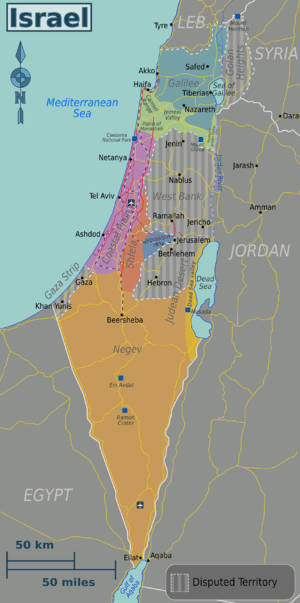
| Galilee (Western Galilee, Upper Galilee, Lower Galilee, Galilee Panhandle, and Sea of Galilee region) A hilly forested region, known for its beautiful landscapes and religious history. The Galilee is composed of five sub regions - the Western Galilee (the northern coastal plain), the Upper Galilee (characterized by mountains, the highest of which is Mount Meron), the Lower Galilee (characterized by relatively low hills separated by valleys), the Galilee Panhandle (in the far northeast), and the Sea of Galilee (the largest freshwater lake in Israel). |
| Carmel Range, Jezreel Valley and Beit She'an Valley From west to the east; the Carmel Range extends from the Mediterranean Sea to the south-east, containing various towns and villages, as well as Haifa, the third largest city in Israel; the Jezreel Valley is a large valley bounded by the Lower Galilee in the north and the mountains of Samaria in the south; and the Beit She'an Valley lies between the Gilboa mountain range and the Jordan River. |
| Israeli Coastal Plain (The Sharon plain, Gush Dan and the Southern Coastal Plain) A planar region which stretches along the Mediterranean coast which is the most developed part of the country and in which about 70% of Israel's population lives. This region is characterized by sandy shores and Mediterranean climate. This region contains many cities, towns and villages, including the Tel Aviv urban area, which is the largest urban area in Israel. |
| Jerusalem Hills A mountainous region in the center of the country, which is a sub-region of the Judaean Mountains. This region includes Israel's capital, Jerusalem, which is the largest city in the country. |
| Shfela The fertile, hilly hinterland bounded by the Coastal Plain in the west, the Judaean Mountains in the east, Samaria in the north, and the Negev in the south. |
| Dead Sea Valley The Dead Sea, which receives its water from the Jordan River, is the lowest point on earth (427 meters below sea level as of early 2013). Technically, the northern half of the western Dead Sea Valley lies in the West Bank and thus Palestine. However, it is part of Area C and therefore under full Israeli control. |
| The Negev, Southern Judaean Mountains, Southern Judaean Desert, and the Arava Valley The Negev region is a desert area covering much of the south of Israel and includes among other the Ramon Crater. The southern parts of the Judaean Mountains region and the Judaean Desert region (the northern parts are on the West Bank) are between the West Bank the Negev regions. The Arava Valley is the section of the Great Rift Valley that is between the Dead Sea in the North and the Gulf of Eilat in the South and forms part of the border between Israel to the west and Jordan to the east. |
Disputed territories
| Golan Heights Mountainous area north-east of the Sea of Galilee region. Occupied in 1967 by Israel, unilaterally annexed in 1981, but claimed by Syria. The annexation of the Golan is only recognized by one other country — the United States, and is not recognized by the United Nations. Israeli law applies in the region. |
| West Bank and Gaza Strip Two physically separate territories, the West Bank to the east of the Jordan River and the Gaza Strip in the southwest along the Mediterranean coast. Not recognized internationally as part of any country. The West Bank receives government services (security, medical service, etc.) by Israel, the Palestinian Authority, or a combination, depending on the exact location as a result of the Oslo Accords. The Gaza Strip is controlled by Hamas. |
Cities
- 🌍 Jerusalem – Israel's capital; a city sacred for millennia to the three Abrahamic religions (Jews, Christians and Muslims), and full of historic sites
- 🌍 Akko (Acre) – an ancient town with a historic port and the most sacred Baha'i site. Its coastal old town is particularly beautiful
- 🌍 Be'er Sheva – the de facto capital of the Negev region
- 🌍 Eilat – the 'Goa of the Middle East', Israel's window on the Red Sea, a vibrant resort city
- 🌍 Haifa – the largest city in northern Israel, on Mount Carmel next to the sea. Home to the Baha'i World Center (a UNESCO World Heritage site).
- 🌍 Nazareth – the hometown of Jesus, now the largest Arab city in Israel
- 🌍 Safed (Tzfat) – a fascinating mountaintop city filled with artists and mystics, home to ARI school of Kabbalah
- 🌍 Tel Aviv – the center of Israel's economy and modern culture. Known as the "White City" for its Bauhaus architecture, it is full of skyscrapers, beaches, markets, and nightclubs
- 🌍 Tiberias – a modern resort town with an ancient background, on the western shore of the Sea of Galilee
Other destinations
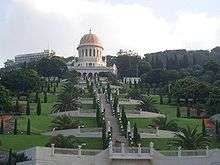
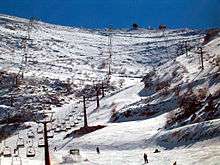
- 🌍 Old City of Jerusalem – a historic walled area within the modern city of Jerusalem. Tourists of different religions and nations come from around the world to visit its holy sites, which include the Dome of the Rock, the Western Wall and the Church of the Holy Sepulchre. A UNESCO World Heritage site.
- 🌍 Old City of Acre – One of the oldest port cities in the world, a UNESCO World Heritage site
- 🌍 Sea of Galilee region – the home of Jesus of Nazareth and the largest freshwater lake in the country
- Dead Sea – a sea of hypersalinated water that keeps people afloat and the lowest point on Earth
- 🌍 Jezreel Valley – an extensive inland valley, largely rural, extending inland from east of Haifa to the Jordan Valley
- 🌍 Judaean Desert – an arid landscape with an array of hills, canyons, and hidden historic sites
- 🌍 Bahá'í Gardens and World Center – center of the Bahá'í Faith, home to the Shrine of the Báb and Terraces, in the northern city of Haifa
Prominent national parks
- 🌍 Masada – high on a plateau above the Dead Sea, the scene of the Zealots' last stand against the might of Rome. A UNESCO World Heritage site.
- 🌍 Ein Avdat – beautiful steep canyon and a popular hiking spot
- 🌍 Caesarea National Park – an ancient Roman and Crusader city with well-preserved remains
- 🌍 Beth Shean Valley – the core of the north Jordan River valley
- 🌍 Belvoir Fortress – a Crusader fortress on a ridge in the eastern edge of the Galilee.
- Nimrod Fortress – remains of a medieval fortress in the northern Golan Heights, 800 meters above sea level.
- 🌍 Rosh Haniqra – spectacular caverns on Israel's Mediterranean coast in the Western Galilee in the north of Israel, near the northern border with Lebanon.
Prominent nature reserves
- 🌍 Ramon Crater – 40 km long crater-like landform in the middle of the Negev desert, the largest of three similar craters found in Israel. Offers breathtaking desert vistas.
- 🌍 Mount Hermon – The mountain is partly in Israel and partly in Syria and Lebanon. The Israeli summit of the mountain is 2,224m above sea level and is the highest location in the country. The total area of the Hermon nature reserve is 76,250 hectares. Most of the nature reserve is in a restricted military area (except for Hermon Ski resort and the Banias springs area at the slopes of the mountain which are popular visited destination).
- 🌍 Carmel Range – a forested hilly region along the Mediterranean coast, southeast of Haifa
See also #Do for Parks and Reserves.
Understand

History
Until the middle ages
While the current state of Israel is a relatively new country founded in 1948, the "land of Israel" has a long, complex history stretching back thousands of years to the beginnings of human civilization. It's been invaded by virtually every Old World empire including the Egyptians, Assyrians, Babylonians, Persians, Greeks, Romans, Arabs, Crusaders, Mongols, Ottomans, French (with Napoleon as general), and British. It is the birthplace of Judaism and Christianity, and also contains sacred sites of Islam and the Baha'i Faith.
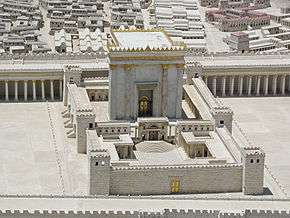
Israel has been inhabited for tens of thousands of years, with Neanderthal remains from the region dating back 50,000 years. Its strategic location serving as a land bridge from Asia to Egypt and the rest of Africa made Israel an ideal target for conquerors through the ages. The first nation to conquer the land was Egypt, in the 16th century BC. In the Fifth Year of Pharaoh Merenptah (roughly 1208 BC) Israel is mentioned on a stele as having been "laid waste" (likely a propaganda exaggeration), which constitutes the first mention of Israel known to history. Incidentally that same year is also the date of an inscription on behalf of the same Pharaoh mentioning the "Sea Peoples" who are often blamed for the virtual collapse of urban and writing society in the eastern Mediterranean of the time, ushering in - among other things - the "Greek Dark Ages" and the collapse of the Hittite Empire. In approximately 1000 BC, an Israelite kingdom was set up under King Saul. According to the Biblical account, King Saul was succeeded by kings David and Solomon, but after Solomon's death the kingdom split in two (though many historians contend that the kingdoms of Israel and Judah were never united but instead were always rival kingdoms). The northern kingdom was conquered by Assyria in 722 BC, and the southern kingdom by Babylonia in 586 BC. Both conquests were accompanied by an exile of the Israelites from their land.
Several decades later, the Persian empire conquered Babylonia, and allowed the Jewish exiles to return and reestablish a province centered around Jerusalem. The Persian empire was in turn conquered in ~330 BC by Alexander the Great. In ~166 BC, the Maccabees rebelled against the Seleucid Greeks and established an independent Jewish state, but this state was conquered in 63 BC by the Roman Empire. Around 30 CE, Jesus of Nazareth began his ministry in the Galilee.
Periodic Jewish revolts against the Romans had some temporary success, but eventually led to destruction and exile for the Jews. The Roman/Byzantine Empire continued to rule the area until the 7th century, when the area was conquered (very briefly) by the Persians, and then by the Muslim Arabs. In the Crusades (11th-13th centuries), Christians were temporarily able to conquer the Holy Land from the Muslims. After 1290, when the Crusaders were expelled by Saladin, the land was ruled by different Muslim rulers. The last of those Muslim rulers was Ottoman Turkey, which was defeated in the First World War. After the war, the area that is now Israel, the Palestinian Territories and Jordan became the "League of Nations Mandate for Palestine", intended in part as a homeland for Jewish people.
Since World War I
- See also: Holocaust remembrance
During the 1920s, the British were handed a mandate to prepare the region for a future Jewish state. Arab pressure led to the eastern part of the mandate being split off into the Arab kingdom of Transjordan (now Jordan) and declared off-limits for Jews.
The first two major waves of modern Jewish immigration were in 1882 and the early 1900s, under Ottoman rule, followed by refugees from Nazi Germany in the 1930s and 1940s. Before 1948, immigration was almost exclusively by Ashkenazi Jews, who spoke mostly Yiddish and/or the national languages of their countries of residence. Initially, religious Jews were largely opposed to the idea of Zionism, and as such the first waves of immigrants were dominated by idealistic but secular Jews.
While several early Arab leaders and individuals welcomed Jewish immigration to develop the largely agricultural land, starting in the 1920s the Arab majority was vocally hostile to Zionism. Both Zionist and non-Zionist Jews were attacked during the riots of 1929 and the later Arab revolt of 1936 to 1939. During World War II, Haj Amin al-Husseini, the Grand Mufti of Jerusalem, openly allied with Nazi Germany and called for an Arab state with no Jews in it. The Jewish population formed several armed groups to defend themselves - the Haganah (precursor to the modern Israeli army) was the largest and most important, but there were also more violent and extremist offshoots like the Irgun. In 1939 the British decided to appease Arab radicals with the "White Paper", which severely limited Jewish immigration just as the Nazis were about to begin World War II. This was bitterly opposed by Zionists. When the British continued to prevent the immigration of Holocaust survivors after the war, Jewish underground groups became heavily involved in illegal immigration, and the more radical groups conducted violent attacks on the British government.
After two years of growing violence between Jews, Arabs, and the British government, in the fall of 1947 the British decided to withdraw from the area. The UN recommended that the territory of Palestine be partitioned into separate Jewish and Arab states, which was agreed to by both the United States and the Soviet Union. The Jews accepted the plan, but the Arabs firmly rejected it. Nonetheless, on 14 May 1948, Jews declared independence as the State of Israel. The Arabs responded with a military invasion. The Israelis won a decisive victory. As a result of the war, approximately 600,000 Arabs were displaced from the territory of the newly proclaimed Jewish state. A comparable number of Jews were displaced from Arab nations in the late 40s and 50s, and many of them settled in Israel.
Initially, France was Israel's most important ally and arms supplier, though Czechoslovakia had also been an important supplier of weapons up till 1949. Israel would participate in the Suez Crisis on the side of France and the United Kingdom in 1956, during which it would gain control of the Sinai peninsula from Egypt. However, under American and Soviet pressure, Israel would be forced to withdraw from Sinai in 1957, though the agreement would also guarantee Israeli ships free passage through the Straits of Tiran. Further fighting continued over the next few decades, and in 1967 the Israelis won another decisive victory against the Arabs, during which it regained control of Sinai from Egypt, and also gained control of the Golan Heights from Syria. Despite urgent pleas by Israel towards Jordan not to attack (Israel had enjoyed a less belligerent relationship with Jordan than other Arab neighbors), King Hussein was ultimately convinced by Egyptian president Gamal Abdel Nasser to attack. The Jordanian attack led to Israel quickly capturing East Jerusalem and the West Bank, leading to the ongoing and controversial situation in both places. In 1973, Anwar Sadat, who had succeeded the deceased Nasser as leader of Egypt decided to launch a surprise attack on Israel during Yom Kippur, one of the highest holidays in Judaism. While the Israeli secret service had hints of an impending attack, Prime Minister Golda Meir decided not to launch a pre-emptive strike for fear of a negative reaction by other countries, particularly the US. Despite early gains by the Arab side, Israel ultimately gained the upper hand, aided by US arms shipments which helped cement what is seen today as one of both countries' strongest and longest lasting alliances. In 1979, a peace treaty was concluded between Israel and Egypt (with Sinai returned to Egypt) with American mediation, and in 1994, a similar peace treaty was signed with Jordan again with American mediation. Both agreements have held to this day. However, a peace process with Palestinian Arabs that began in the early 1990s failed in 2000, and little progress has been seen since then. In the 21st century other actors than the US have tried to mediate in the conflict, but neither the EU nor the Arab League have had more luck than US mediation.
Israel is still officially at war with neighbors Syria and Lebanon, and has similar hostilities with the Hamas organization which controls the Gaza Strip. However, these borders are usually quiet - infrequently shells or rockets will be fired across them, and on rare occasions a full-scale conflict will break out (for example, in 2014 on the Gaza border). There are also occasional cases of individual violent attacks between Israelis and West Bank Palestinians, who have significant interaction in the West Bank and Jerusalem.
Economy

Israel has a technologically advanced market economy with substantial government participation. It depends on imports of crude oil, grains, raw materials and military equipment. Despite limited natural resources, Israel has intensively developed its agricultural and industrial sectors since the 1980s. Cut diamonds, high-technology equipment, aircraft, high-tech defense systems, chemicals and chemical products, machinery and equipment, transport equipment, rubber, plastics, and textiles and services in various fields are the leading exports. Large reserves of offshore natural gas have been discovered since 2009.
For many years Israel posted sizable current account deficits, which were covered by large transfer payments from abroad and by foreign loans. However, tight fiscal policy of and the high growth rates led Israel to a budget surplus. Roughly half of the government's foreign debt is owed to the US, which is its major source of economic and military aid.
Israel's economy grew rapidly in the 1990s due to immigration from the former USSR, the opening of new markets at the end of the Cold War, the optimism of the peace process, and the dot-com boom. However, in 2000 the combination of a second intifada and the dot-com bust led to a severe recession. Since 2004 the economy has resumed growing, and Israel was one of the world's most resilient economies during the 2008 "Great Recession". Israel is a developed country and has a GDP per capita similar to southern European countries like Spain and Cyprus. While the GDP is thus a bit lower than in the richer parts of Europe, cost of living - especially in big cities like Tel Aviv - is surprisingly high and there is a long-standing debate about the problem of economic emigration.
People
The most obvious division in Israel's society is between Jews - who make up 75% of the population in Israel proper and 15%-40% in areas captured by Israel during the Six-Day War (West Bank, East Jerusalem and the Golan Heights) - and non-Jews (mostly Israeli-Arabs), who make up nearly all of the rest. In addition, some 350,000 people who emigrated to Israel from the former Soviet Union are not considered Jews according to halacha (Jewish law), though they largely identify with the Jewish mainstream. In terms of religious backgrounds, 77% of Israelis are Jewish, 16% are Muslim, 4% are Christian Arabs, and 2% are Druze (a Muslim offshoot considered heretical by mainstream Islam).
There are also deep divisions within Jewish society. First is the cultural division between the 'Ashkenazim', who lived in Europe for nearly 2,000 years and are generally considered wealthier and politically better connected, and the 'Sephardim' and 'Mizrahim', who immigrated from the Middle East, Yemen and North Africa (Sephardi and Mizrahi immigrants from Europe tend to match the socio-economic profile of Ashkenazim). However, the divide between these ethnic groups has greatly narrowed, and intermarriage has become common. Massive immigration of Ethiopian Jews in the 1980s and Russian-speaking Jews in the 1990s had added additional notable demographics to Israel's population.
While ethnic divisions have weakened as the native-born population has increased, religious tensions between 'secular' and 'Orthodox' Jews have increased. The spectrum ranges from the stringently-orthodox 'haredim' (who form only 9% of the population but wield a disproportionate amount of power thanks to Israel's fractious coalition politics), to 10% who are 'religious' (similar to 'modern Orthodox' outside Israel), 15% 'traditional-religious', 23% 'traditional', and 43% 'secular'. While secular and traditional Jews are widespread throughout all of Israel, Orthodox Jews tend to concentrate mostly in certain cities such as Jerusalem, Bnei Brak and Ashdod. Despite the common perception of religious Jews being more ardent Zionists and secular Jews being more open to "land for peace" deals with the Palestinians, ultra-Orthodox Jews (a term rejected as pejorative by many) are actually largely opposed to the current Israeli state and some consider Zionism blasphemous as they believe that only the Messiah can restore Israeli statehood. On the other hand, large groups of Russian-speaking or Mizrachi Jews are relatively secular but vote for parties generally considered to fall into the "hawkish" camp and are opposed to any kind of deals with Syria, Lebanon or Hamas.
Holidays
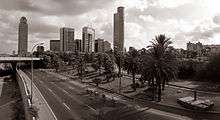
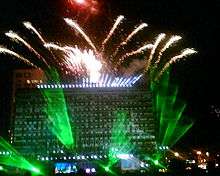
- Israel's time
- is + 2 hr from GMT (UTC) so when it's 18:00 in London, or 13:00 in New York (EST), it's 20:00 in Israel. Since 2013, daylight savings time (summer time) begins on the last Sunday in March, and ends on the last Sunday in October (the same dates used for time changes in Europe).
- Shabbat
- Many businesses and transport companies do not operate on "Shabbat" (the Sabbath) which begins Friday afternoon and ends Saturday night, while many places do not reopen/renew service until Sunday morning. The same holds true for major Jewish or national holidays. This is critical if you rely on the bus or train to explore the country or go to/from the airport (planes do fly on Shabbat, except for El Al airline). So plan your itinerary accordingly.
- Public holidays
- Different levels of activity stop in Israel depending on the festival or holiday, and different areas will see different levels of activity on these days. Public transportation usually stops completely on most holidays. Holidays in Israel follow the Jewish calendar, which means that the Gregorian date will vary from year to year although tending to fall within the same 6-week period. In the Jewish tradition, a new day begins at sunset, meaning that Jewish holidays begin on the eve of the official date (not at midnight). A list of Gregorian dates matched with the National holidays and Jewish holidays can be found at the holidays section of the "GoIsrael" site. A more elaborate list of Jewish holidays and dates can be found at the Jewish holidays section of the Chabad site, although some of the holidays mentioned there are scarcely celebrated or have no influence on day-to-day activities.
Holidays on which stores and public transportation are closed (similar to Shabbat) are marked with a plus sign (+):
- + Rosh Hashanah (Jewish new year). falls between 5 September and 5 October. It is two days long.
- + Yom Kippur (Day of Atonement). falls between 14 September and 14 October. The holiest day in the Jewish Calendar on which EVERYTHING comes to a halt: all businesses, banking, shopping, entertainment, restaurants, public and private traffic, etc. Children on bicycles, rollerblades and skateboards flood the streets of secular towns. Emergency vehicles have limited mobility.
- + Sukkot (Feast of Tabernacles/Booths). falls between 19 September and 19 October, and lasts 7 days. Only the first day is a national holiday with stores and public transportation closed, but some disruption occurs during the other days.
- + Shemini Atzeret (Simchat Torah). falls between 26 September and 26 October; it is effectively the 8th day of Sukkot. Street festivals and dancing are common in most cities and towns on the preceding evening.
- Yitzhak Rabin's Remembrance Day (Yom Hazikaron le Yitzhak Rabin). falls between 25 October and 9 November. It is a memorial day. Also, on the Saturday adjacent to 4 November a memorial rally is held on Rabin square in Tel Aviv, and other locations.
- Hanukkah. falls between 27 November and 27 December, and lasts 8 days. It is celebrated by lighting candles and eating jelly doughnuts, sufganiot.
- Purim. falls between 24 February and 26 March (outside Jerusalem). Children and adults dress in costumes and street parades are common on this day. In Jerusalem, Purim is celebrated one day later than in the rest of Israel and is officially known as Shushan Purim.
- + Pesach (Passover). is seven days long; the first day falls between 26 March and 25 April. (Only the first and last days are national holidays with stores and public transportation closed, however there may be some disruption during the intermediate days.) No leavened bread or grain products are sold or served in most places during this week (including beer and some alcohols). On the evening after Passover ends, the custom of "Mimouna" is celebrated, involving hospitality and traditional home-made cuisine.
- Yom HaShoah (Holocaust Remembrance Day; Yom HaZikaron LaShoah VeLaGevurah). falls between 7 April and 7 May. A memorial sirens sound at 10:00; the entire country observes 2 minutes of silence in memory of victims of the Holocaust. Restaurants and entertainment establishments are closed on this day and its eve.
- Yom HaZikaron (Fallen Soldiers Remembrance Day; Yom HaZikaron LeHalaley Ma'archot Israel VeLenifga'ey Pe'ulot Ha'eiva). falls between 14 April and 14 May. A memorial sirens sound on the eve (20:00) and in the morning (11:00); the entire country observes a silence in memory of its fallen soldiers and terror attack victims.
- + Yom Ha-Atzmaut (Independence Day). falls between 15 April and 15 May. Large street festivals, city-wide parties and fireworks displays are held on the eve. The day is usually celebrated by sightseeing and picnicking. Yom Ha-Atzmaut always falls the day after Yom HaZikaron, and as the Jewish day traditionally begins and ends at sundown, the transition from sorrow to celebration on streets all around Israel as night falls is truly something special.
- Lag Ba'Omer (33rd day of the 'Omer'). bonfires are common on the eve.
- Yom Yerushalayim (Jerusalem Day). parades and festivals occur in Jerusalem.
- + Shavuot (Pentecost). falls between 15 May and 14 June
- Tisha B'Av (9th of Av fast). commemorates the destruction of the First and Second Temples.
Electricity

The voltage in Israel is 230 V, and the frequency is 50 Hz. The electric outlets used are type H and Type C. Type H is a uniquely Israeli three-pronged standard, but most modern type H outlets can also accept type C European two-pronged plugs. In fact, most electronic devices in Israel use type C plugs. For more information on plug types, please see our Electrical systems article.
Climate
Many tourists visit Israel in the summer, not realizing the potential of other seasons. Summer in Israel is very hot; the coastal areas are humid as well as hot, and the landscapes are parched brown since it never rains during the summer. The other three seasons, in contrast, have absolutely beautiful weather. In spring and autumn the temperature is mild every day and nearly all days are sunny. Winter is a mixture of cold, rainy days and cool, sunny days which are great for hiking and touring. So while summer may be the most convenient time to visit Israel, any other season is much more enjoyable.
Especially during the summer, it is important to wear a hat and drink more water than you usually do so to stay cool and hydrated in the heat. Also, hilly inland areas in Israel (particularly Jerusalem and the north) occasionally experience snowfall in the winter, sometimes heavy enough to bring those areas of the country to a standstill such as in December 2013. If visiting Israel during a heavy winter storm, it is advisable to avoid traveling as roads will be dangerous and public transportation may be severely impacted.
Talk
- See also: Hebrew phrasebook, Arabic phrasebook

Hebrew is the official language of Israel, while at least 20% of the population speak Arabic as well. Until 2018, Arabic was a co-official language. Whether the change of status will change signage and public communication remains to be seen.
English is the most popular foreign language, and Israelis study it in school from an early age. Nearly anyone you meet on the street will be able to communicate with you in English. All street and road signs (and many others) have English, as well as the Hebrew and Arabic names.
Massive immigration from the former Soviet Union in the 1990s brought a large number of immigrants who speak Russian. Other commonly encountered languages in Israel, reflecting the diverse origins of Israelis, include Romanian, French, German, Polish, Amharic, and Spanish. Some of the older members of the population and some of the ultra-orthodox population speak Yiddish, a Central/Eastern-European Germanic Jewish language. Foreign workers from China, the Philippines, Thailand, and other Asian countries can be seen everywhere in central Israel. You can hear a mix of a dozen languages while on buses, trains or walking in transportation hubs, especially in the Tel Aviv central bus station.
While speaking Hebrew slang, words of Arabic origin are commonly used. For example: "Walla?" (Is that so?), "Yalla!" (Come on, let’s move!), "Sababa" (great), "Akhla" (good), "Sachbak" (friend), and many more. Street talk is also much affected by military jargon, which is second nature to many Israelis.
Foreign television programs and films are mostly American, and almost always shown in their original language with subtitles. Only children's programs are dubbed into Hebrew.
Get in
Entry requirements
- See also: Visa trouble
 |
Visa restrictions:
Due to the ongoing Israeli–Arab dispute, Afghanistan, Algeria, Iran, Iraq, Kuwait, Lebanon, Libya, Saudi Arabia, Somalia, Sudan, Syria, and Yemen block passports containing stamps or visas from Israel. You may also have difficulties getting into and/or be refused visas to other Islamic countries, such as Bangladesh, Brunei, Indonesia, Malaysia, Pakistan, etc. However, this is no longer a problem since in most cases Israeli passport control no longer stamps visitors' passports. Under a new system, visitors entering Israel are given special entry cards by the passport control.
Having said that, be careful if entering or exiting Israel by land though (e.g. from Jordan or Egypt), as a stamp from the land border crossing or a neighboring country with Israel will be taken as evidence that you have visited Israel, and could also result in you being denied entry to any of these countries, especially to the former countries mentioned. In this case, you'll have to apply for a second passport, which allows you to have a stamp of any neighboring countries or even Israel in one passport and travel to Arab states with another one. (Inquire at your own embassy.) Arab customs might also check for luggage stickers (or their residue) from Israel or neighboring countries on your suitcase or the back(s) of your passport. So, remove any leftovers or signs of them. |
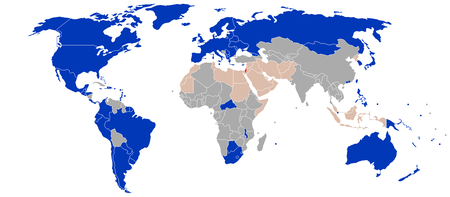

Foreign nationals of the following countries/territories can enter Israel visa-free for up to 3 months: all European Union member states, Albania, Andorra, Argentina, Australia, Bahamas, Barbados, Belarus, Belize, Botswana, Brazil, Canada, Central African Republic, Chile, Colombia, Cook Islands, Costa Rica, Dominica, Dominican Republic, Ecuador, El Salvador, Eswatini, Fiji, Georgia, Grenada, Guatemala, Haiti, Honduras, Hong Kong, Iceland, Jamaica, Japan, Lesotho, Liechtenstein, Macao, Malawi, Mauritius, Mexico, Micronesia, Moldova, Monaco, Mongolia, Montenegro, Nauru, New Zealand, Niue, North Macedonia, Norway, Palau, Panama, Papua New Guinea, Paraguay, Peru, Philippines, Russia, Saint Kitts and Nevis, Saint Lucia, Saint Vincent and the Grenadines, San Marino, Serbia, Singapore, Solomon Islands, South Africa, South Korea, Suriname, Switzerland, Taiwan, Tonga, Trinidad and Tobago, Ukraine, the United States, Uruguay and Vanuatu.
If, however, you are suspected of being of overt and illegal activities, of Arab descent, Muslim, or a political activist, there is a possibility of you being subject to additional questioning, searches and/or denied entry, if they are not satisfied after questioning, according to the US Department of State. Be aware that holding citizenship in one of the above listed countries does not guarantee entry. Decisions are left to the discretion of immigration officers.
A visa or residence permit will not be granted to you if you, or the organization you're part of, have knowingly issued a public call to boycott the state of Israel or pledged to take part in such a boycott.
German citizens born before 1 Jan 1928 do have to apply for a visa in advance. This visa will be given if you were not heavily involved in persecution during the Nazi era and will be valid for the whole time your passport is valid.
For some Arab states it constitutes a crime for their citizens to enter Israel at all. Even if you're an Arab-born citizen of a European or North American country, having entered Israel may have consequences when going to your (other) country of citizenship.
Israeli Customs and Immigration officers may take a dim view of travelers arriving from Arab countries, but you are unlikely to face anything worse than very time-consuming and repetitive but polite questioning. Depending on the situation, if you have stamps from other Arab countries in your passport, you should expect to be taken to one side (without any explanation) and eventually questioned. This can take anywhere from 10 minutes to several hours. The key thing to remember is this: if you have nothing to hide, then, other than the inconvenience of questioning, you should have nothing to be worried about. If you are a young backpacker, especially if you travel alone, it is much more likely you will be detained for questioning in Ben Gurion airport. There is a "selection committee" of 2 security guards waiting when you go up the escalators from your flight, and if you seem suspicious they will not hesitate to stop you. If you dress up nicely or seem a part of another group or a family they are less likely to bother you.
If you're in Israel on a tourist visa (B2) and decide to renew your visa for a longer term, you may do so at the Ministry of the Interior Visa office for a small fee. Just call Ministry of Interior Call center at +972 2 629-4666 to find out where is the office near you. Alternately, citizens from most European and North American countries can renew their visas by crossing into Jordan and back at the Arava border crossing near Eilat or by crossing into Egypt and back at Taba.
By plane
- 🌍 Ben Gurion International Airport (TLV IATA). Israel's main international airport. 12 km from central Tel Aviv and approximately 40 km from Jerusalem. It is the main hub for flag carrier EL Al and also served by many other European and Asian airlines. Most visitors to Israel enter through this airport. See the article for a full description.
- 🌍 Ramon (Ila & Assaf Ramon Airport, ETM IATA) (On Hwy 90, 20 km north of Eilat). This opened in Jan 2019, and now handles all flights to Eilat, plus it acts as the diversion airport for Ben Gurion. It replaces Ovda and Eilat city airports, both of which have closed. It's on the main north-south bus route along Hwy 90, see Eilat for practicalities.
By boat
It's surprisingly difficult to travel to Israel by boat. The main route is from Limassol in Cyprus to Haifa, and the main operators are Louis Cruises and Salamis Cruises . As the name says, these are cruise services and they do not advertise one-way fares, but they may be willing to carry you for around €150-170 if you're persistent and they have space — showing up at the port office on the day of departure may work. Both companies seem to start and stop cruises on short notice, so enquire locally. Cruises to additional Mediterranean locations are operated by Mano Cruise.
If you manage to hitch a lift on a freighter, Israel's major sea ports are:
Private yachts use the marinas at:
By road
There are land routes from Egypt and Jordan to Israel; these border crossings have security measures similar to the airports. There are no land routes to either Syria or Lebanon, owing to the continuing hostilities with these countries.
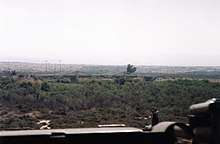
Jordan has three crossings with Israel: the Allenby/King Hussein Bridge (the shortest way between Amman and Jerusalem, the busiest crossing); the Jordan River/Sheikh Hussein Bridge (in the north); and Arava/Yitshak Rabin (2 km from Eilat). It's fairly straightforward to cross using a series of buses, though pay attention to the childish Aqaba border taxi Mafia. If you cross the King Hussein Bridge you will not be given an exit stamp for Jordan, and you will not be stamped on re-entry if you choose to return. Mentioning West Bank destinations in your itinerary will arouse suspicion – it is just best to avoid mentioning Palestine at all while passing the border.
From Egypt you can cross the border at the Taba Border Terminal, near Eilat. From the terminal to Eilat, take bus number 15, or a taxi. The terminal is open 24 hours a day, 7 days a week, with the exception of the Jewish Yom Kippur (Day of Atonement) and the Muslim Eid al-Adha (Feast of the Sacrifice).
Israeli rental cars are not generally permitted across the borders for insurance reasons; in addition, it may not be advisable to travel in Arab countries while displaying an Israeli number plate.
Travellers leaving Israel by land will need to pay an exit fee at the border. (No fee needs to be paid at the airport – it may be included in the ticket cost.) As of 2015, the fee is ₪176 for Allenby Bridge, and ₪101 for all other border terminals.
By bus
From Amman
- There are daily buses to Nazareth via the Sheikh Hussein bridge (near Beit Shean), call the operator (+972 4 657-3984) for details. From Nazareth there are buses to Haifa, Tel Aviv, and other destinations.
- Alternatively, you can take a bus to the Sheikh Hussein bridge, cross the border on foot, and get to Israeli destinations by taxi/bus.
- If you don't have Israeli citizenship, you can use the King Hussein border crossing near Jericho. Take a taxi from the north bus terminal in Amman (JOD5 each for four people sharing: if you don't have a group, either wait for either people to arrive or pay JOD20 and go yourself). After clearing Jordan customs, a separate JETT bus will take you across the border to Israeli customs for a small fee, then once past Israeli customs, a Palestinian bus company offers buses to Jericho and Ramallah. From Ramallah, a share taxi will take you to Jerusalem.
From Cairo
- There are twice-weekly buses to Tel Aviv and Jerusalem (USD90 one way) via Eilat, operated by Mazada tours (Tel +972 2 623-5777). You still have to change buses at the border. (Use Mazada tours at your own risk! They subcontract the Egyptian side of the journey and do little to nothing to help if there is any mix up. At least one Mazada group from Tel Aviv/Jerusalem reportedly was held at the Taba Border - Egyptian side for 7 hours because the Israeli company failed to pay the Egyptian company.)
- Alternatively, you can take a bus to Taba, then cross the border to Eilat on foot.
Get around
Israel has a modern, sophisticated travel network. It is safe and easy to get around the country. Israelis are always willing to help a lost tourist, so never be afraid to ask people for directions or advice.
Travelers should also be aware of Shabbat (Hebrew: שַׁבָּת) the Hebrew word often spelled "Sabbath" in English. From Friday sundown until Saturday sundown, travel can be difficult and expensive. Most national buses do not run on Shabbat. For inner-city bus travel, it will depend on the city. Places like Haifa, Nazareth, or Eilat will have bus service throughout Friday night and Saturday. There will be limited taxi service, and the drivers may ask for a surcharge for fares, especially on Friday afternoon. In preparation for Shabbat, many people will be on the move, so traffic will be worst on Friday afternoon. Travelers should allow for extra travel time. This also applies to days preceding public holidays.
Public transport is used heavily by soldiers traveling to/from their bases, so a bus or train packed full of soldiers (some armed) is a common occasion and does not indicate any special occurrence. One can expect higher crowding on Thursday evening and Friday morning (due to weekend leave) and very high crowding on Sunday mornings until about 10:00 (due to soldiers returning to their bases).
The (official) national call center for public transportation information (available in English as well) is on *8787 or 072-2588787 (for phone with no access to *star numbers). There is no fee except for regular call-charge. The public transit mobile application Moovit is also highly recommended since Google Maps will not have information on all public transit routes or accurately reflect delays or political disturbances.
By bus
- See also: Bus travel in Israel
Buses are the most common form of public transportation for Israelis and travelers alike. Bus travel is the cheapest way to get around Israel, and is extremely safe and reliable. Israeli soldiers travel for free on most public bus routes, so travellers will often see armed soldiers on buses. The largest bus company in Israel is called Egged (pronounced "Eh-ged") (Hebrew: אגד), which was formed in 1933. Egged operates 55% of the country's public transportation service lines.
Intercity buses typically begin and end their routes at central bus stations, and also pick up and drop off passengers along the route. Buses do not have toilets on them, but very long routes will stop every couple hours at a rest stop with toilets and refreshments (just remember, that if you are not back on the bus in time, the driver will leave without you). Intercity bus tickets to/from Eilat, unlike other buses in Israel, must be reserved before traveling.
Riding a bus in a city can be a completely different experience. If you are not a Hebrew speaker, it can be difficult to find the right bus route or company. Ask people around you for help. If you are beginning your journey from a bus station, ask an employee for help. If you are unsure where to get off the bus, sit near the front and ask the bus driver to help you. Most drivers are willing to help, as are most passengers.
Google Maps offers directions for travel in Israel based on bus schedules. More accurate real-time bus arrival information is provided by apps such as Moovit and Effo Boos, which are in Hebrew.
By Sherut
A sherut (Hebrew) or servees (Arabic) is a shared taxi that seats more than four people (the usual capacity is ten). Depending on the circumstances, a driver will follow a predetermined route like a bus, or will transport a group of people from one location to another based on demand. A sherut can be hailed from anywhere, but can be easily found outside major bus stations. They are usually quicker than buses, and will usually stop at any point along the route (not just predetermined stations). Prices vary depending on the length of the trip and are not negotiable. Drivers can wait until their sherut is full before beginning their journey, so if you are the first person or are departing at a low-traffic time it may be a lengthy wait.
This form of transportation is best when traveling from a large bus station to a surrounding town or suburb, with a precise destination in mind.
By train
.png)
Since about the late 1990s, Israel's train system has undergone a major program of expansion and modernization. Trains are generally quicker and more comfortable than buses. However, train stations are often less conveniently located than bus stations and parts of the country - including much of the South - are not yet connected to the rail network. Free WiFi is provided on trains. Many of the stations date only to the 2000s or 2010s and are thus a reflection of the architectural taste of that era and cost constraints and usually far from the historical core of towns. However, they were usually built with that limitation in mind and thus bus services to get you to points of interest in town usually depart from the stations.
Israel Railways runs intercity lines from Nahariya to Be'er Sheva via Haifa, Tel Aviv and Ben Gurion airport, from Jerusalem to Tel Aviv, and suburban lines radiating from Tel Aviv to Binyamina, Ashkelon, Kfar Sava, Rishon LeZion, Modiin and Bet Shemesh. There is also a suburban line between Be'er Sheva and Dimona.
Tel Aviv has 4 train stations, Haifa (including its eastern suburban neighborhoods) has 6, and Be'er Sheva has 2, providing easy access to many parts of those cities.
Trains run 2-3 times per hour in peak travel times and at least once an hour at off peak hours. Trains on the Nahariya-Haifa-Tel Aviv-Ben Gurion Airport-Be'er Sheva line run through the night too. However, after midnight, trains stop in Haifa at the Hof Hacarmel station only, in Tel Aviv at Merkaz (Central) only, and in Be'er Sheva at Merkaz (Central) only. All other Be'er Sheva, Tel Aviv and Haifa stations close after midnight. One must also remember that trains operate only on weekdays (there are no trains from Friday afternoon till Saturday evening). In fact, the trains stop several hours earlier on Friday than buses do.
A new line to Jerusalem from Ben Gurion airport opened on a trial basis on September 2018; see Jerusalem for details. There is also an old, scenic Ottoman-era line to Jerusalem via Beit Shemesh, mostly useful for tourists. During holiday periods it can get crowded.
By taxi
Taxis are very common in Israel. To differentiate from a shared taxi (sherut), a regular Israel taxi is sometimes called special (using the English word). The driver should use the meter both inside and outside cities (in Hebrew, moneh), unless the passenger agrees to prefix a price (however agreeing to go off the meter is almost universally in the driver's favor). There are surcharges; for calling a taxi by phone (₪5.00 as of January 2013), for luggage (₪4.20 a piece), for more than 2 passengers (₪4.70 (fixed), passengers that are children under the age of 5 are not taken into account), for taking toll-routes and for hailing a taxi at airports or seaports (Ben Gurion airport - ₪5.00, Sde Dov airport and Haifa seaport - ₪2.00).
Drivers are known to try to cheat tourists by not turning on the meter to begin with and then fighting about the cost at the end of the ride. It is best to specify that you absolutely require the 'moneh' to be activated before you leave unless you know how much the trip should cost, in which case you can make a deal. However, if you are caught off guard some drivers will become extremely rude or even violent if you refuse to pay despite the meter never having been switched on. It is best to try to avoid this situation, but it is better to avoid any conflict with the driver by paying and learning rather than saving your money and risking an unpredictable escalation. Noting the taxi's number (clearly visible on the outside of the cab) and contacting the local taxi authority is an efficient form of redress.
A good way of avoiding scams is to order taxis with the Gett/GetTaxi smartphone app. Gett use only licensed taxi drivers and the same fare structure as any other taxi ride. It gives the fixed price or meter price directly to you, allows for credit card payment (none of the "I have no change" nonsense), and you can put in your specific destination and see that the driver isn't taking a roundabout route to run the meter up.
Israeli taxi drivers do not expect a tip, and neither should you generally offer one. In addition, they are more likely to round the fare down to the nearest shekel than up.
All Israeli taxis are numbered, and all print out an official receipt on printers attached to their meters (if you request), useful if you are traveling on business.
As of 2017, "ridesharing" companies like Uber and Lyft do not operate in Israel. The Gett smartphone app is the best option.
By thumb
Israel was once one of the easiest places to hitch-hike in the world. However, nowadays people, and especially tourists with cars, are (understandably) more wary, so waiting for a ride in an unlucky place can easily take two hours or more. Whereas in Jordan almost every third car will stop, in Israel dozens of cars can go by without any luck. The West Bank is considerably easier. Nevertheless, if you are on a tight schedule, you should not really rely on hitch-hiking.
Having said that the patient traveller will be rewarded with friendly locals and great stories. Most major junctions have a shelter and are well lit throughout the night. A sign can help (put a blank piece of paper inside a plastic sleeve, and with a dry-erase marker you have a reusable hitch-hiking sign). When hitch-hiking, don't use the thumb, instead extend your hand, with 1 or 2 fingers extended, pointing at the road. For short rides, the 1 or 2 fingers should point to the ground. Drivers staying in the area may point downwards while passing, indicating that they wouldn't make a good long-haul ride.
Generally speaking, hitch-hiking is more accepted in rural areas, particularly sparsely populated areas like the Golan Heights or between smaller towns in the West Bank that have little bus service, than in cities. Local West Bank settlers rely heavily on hitch-hiking for transportation. Almost every car will stop and suggest a lift if you stand in any settlement's gate as most of them are defended by IDF soldiers.
Nevertheless, inside the West Bank you should never hitch-hike from Jewish settlements/cities to Palestinian areas (or vice-versa); this is considered quite dangerous - in the past Israeli hitch-hikers have been kidnapped and murdered by Palestinian extremists while waiting for a ride. On the contrary, extremists also went into taxis with a suicide belt. So either side must be wary. The British Foreign Office considers it unsafe to hitch-hike in Israel, like most countries in Europe and the Middle East. This advice applies specifically to tourists and is neither a comment on the safety of hitch-hiking for locals nor specific to Israel. However, while the local conflict is disturbing and highly complex, Palestinians are generally as friendly as Israelis, especially when hitch-hiking, and even more if you are not of Israeli or American nationality. Foreigners have rarely been targeted directly by extremists (except for the Gaza Strip), and Palestinians have no interest in deterring tourists from spending their time and especially money in the West Bank.
Also read through Wikivoyage's general guide, which provides a lot of good advices on the how, where and when of Hitchhiking.
By car
Road system
Israel has a modern highway network, connecting all destinations throughout the country. In general, avoid travelling by car as traffic is significant in all daylight hours, drivers are aggressive, and road signage while abundant is often confusing.
Road signs often follow city names (rather than compass directions). Than means, that you will see signs to Road 1 Jerusalem and Road 1 Tel Aviv, rather than Road 1 West and Road 1 East, so generally you must follow the name of the largest city at the direction of your destination, even if it is not marked. For example, when traveling from Haifa to Be'er Sheva, you will need to travel southwards which means to follow signs directing to Tel Aviv. When approaching Tel Aviv, you will start see directions to Be'er Sheva. When getting directions, it's best to ask for the name of an exit as well the exit just before it.
Roads are numbered according to orientation and significance. In general, east-west roads are given odd numbers, and north-south roads are given even numbers. Numbers generally increase from south to north, and east to west. The most significant national highways are numbered using one or two digits, while the least significant local roads are numbered using four digits. Exceptions to these rules do exist.
| Roads with single-digit numbers are important, nationally significant roads. Most of them are at least partly motorways (freeways). The motorway parts are colored blue, the non-motorway parts are colored red. | |
| Roads with two-digit numbers have regional significance. They are normally colored red, but in a few cases they are motorways and colored blue. | |
| Roads with three-digit numbers usually have lower importance and are short (under 20 km). They are colored green, except for a few motorways which are blue. | |
| Roads with four-digit numbers are least important, often only a few km long, and sometimes dead ends. Their signs are colored brown. | |
Driving regulations
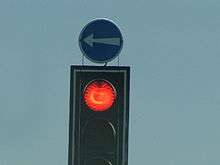
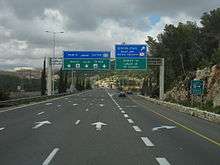
* yellow - outer edges of the road
* white -traffic in the same direction and in opposite directions
Road signs:
* straight: road #443 to Modi'in, Atarot airfield (pictogram) and industrial zone(pictogram)
* Exit right: road #1 to "Maale Adumin", to Mt. Scopus and to Hadasa Mt. Scopus Hospital (pictogram)
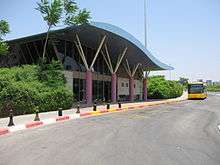
Traffic in Israel drives on the right. Traffic signs and regulations are generally standard and resemble those of Western Europe. Highway signage is usually in Hebrew, Arabic, and English, although sometimes just in Hebrew and English. Having signs in 3 languages (Hebrew, English, Arabic) usually makes signs overloaded with text, thus only the name of the destination is written in text and a pictogram is used for the type of destination. Usually, each traffic light has an arrow on top, and the traffic light then controls travel to the indicated direction, with a green light guaranteeing that all conflicting traffic faces a red light. Lights without arrows above them control all directions. Red light always means stop. Turning right or left at a red light is strictly forbidden. There is no turning left or right while yielding to opposite traffic, since conflicting traffic always faces a red light, even in the absence of arrows (however, this is not always the case with pedestrians, particularly when turning right). As in several other countries, the green phase is preceded by a red+yellow combination phase. A flashing green light indicates that the yellow light is about to appear, but can usually be found only on roads with speed limits of at least 60 km/h.
White road markings are used to separate both traffic travelling in the same direction and in opposite directions. Yellow lines are used to mark the outer edges of the road (do not cross these, except if stopping at a shoulder), and orange or red lines are used in road works zones or following a change in road signs. Traffic circles (roundabouts) are very common; one gives way to cars already in the circle. There are no all-way stop signs like the ones the USA, Canada, and South Africa. All stop signs require drivers to yield to all conflicting traffic after coming to a complete stop.
Headlights must be turned on (even during the day) on intercity highways from November to March. Motorcyclists have to have their headlights on in all months of the year. Seat belts must be worn at all times in all seats. Using a mobile phone without a hands-free system is forbidden. If one must exit the vehicle on the shoulder of a highway, it is required to put on a reflective vest in order to promote visibility. It is required to keep the reflective vest at all times within the passenger's cabin of the vehicle, and not in the trunk. Car rental companies are required to supply such a vest and it is usually inside the glove compartment.
Parking regulations are indicated by curb markings:
- Red and white - Parking is prohibited, although this rule is often flouted outside weekday daytimes. However, just because others are doing so, doesn't mean your car won't be fined or towed.
- Red and yellow - Reserved for certain vehicles, such as buses at bus stops.
- Blue and white - Parking only with a parking permit purchased at a machine. There is not always a machine nearby, if so, cellphone payment system must be used. In some areas, such as in parts of Tel Aviv, blue and white markings are restricted even at night to residents only. A sign at the beginning of the street, usually in Hebrew only, will detail the specific restrictions.
- Red and Grey - Reserved for residents, but might only be reserved at specific times as stated in signs.
- Grey - Areas are free to park at, unless a parking sign at the beginning of the street requires payment or restricts it.
- Black and While - Marked for curb visibility, when no other coloring apply.
Israel uses the metric system of measurements. Default speed limits are 50 km/h in residential zones, 80 km/h on intercity roads without a physical separation median between opposing lanes, and 90 km/h on intercity roads with a physical separation median. By default, all major freeways (identified by the standard blue European motorway sign) have a speed limit of 110 km/h; however, in practice, speed limit signs bearing a lower limit (usually 90 km/h or 100 km/h) limit the speed on these roads. Only one freeway, toll highway #6 (Cross-Israel Highway) allows 110 km/h in most sections.
Police presence on the roads is generally very significant, and speed and red light cameras are common. Both radar (mostly stationary) and LIDAR (laser, hand-held) are in use for speeding enforcement.
Police vehicles in active duty may have their blue lights turned on for the duration of their trip. Unlike most countries in the "First World", in Israel this is not a sign that they want to pull you over. If they do, they would either turn on their siren or use a loudspeaker to instruct you to stop on the shoulder. A verbal request, although usually made in Hebrew, will usually include the make of the car. It is advisable to comply.
Toll highways
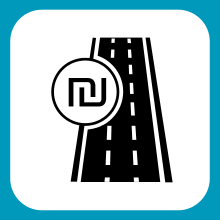
- Israel's Highway 6 is an electronic-toll-highway, unique in having no toll booths. Vehicles using it are identified by license plates and/or electronic tags, and bills are sent to the vehicle's registered owner.
- The cost is determined by the number of road segments that are used:
- On the main section (from 'Iron interchange to Sorek interchange) the minimum charge is for 3 segments (even if you drove through less segments) and the maximum charge is for 5 segments (even if you drove through more segments).
- On the northern segment (one segment from 'Iron interchange to Ein Tut interchange) there is a separate special charge, as it's not a part of the main section.
- The southern section (from Sorek interchange to Ma'ahaz interchange) is free of charge.
- Various subscriptions are available. Consult your rental company regarding payment of route 6 rides, as they often carry a surcharge.
- The Carmel Tunnels are a set of 4 tunnels (2 in each direction with the Neve Sha'anan interchange between them) that crosses Haifa under the Carmel mountain. The cost is determined by the number of segments that you use (1 or 2 segments). There are toll booths in this road.
- The Fast Lane to Tel-Aviv is a 13 km stretch from the Ben-Gurion airport intersection with Route 1, ending at the second highway exit to Tel Aviv, the Kibbutz Galuyot exit. The price is determined by the number of vehicles entering the lane, to keep traffic flowing smoothly. The maximum toll is ₪85, but is usually much less.
Licensing information
All drivers in Israel must carry a driver's license. International driver permits, as well as licenses from foreign countries are accepted. Drivers of motor vehicles must be at least 17 years old, while insurance is mandatory. Driving a motorcycle or a moped is permitted starting at the age of 16. A drivers license is mandatory for two wheel vehicles as well! All cars in Israel must undergo an annual safety inspection, and a sticker bearing the month and year of the next inspection should appear on the front windshield. Every car is required to carry a yellow reflective vest at all times. Theoretically, the police could stop you at any time and ask to see it. If you stop on the edge of the road, and have to get out, you are required by law to wear the vest. All rental cars should have one, so it is a good idea to check before you leave. In Israel while you are driving, the police are allowed to stop you for any reason whatsoever; mostly they do so for license checkups. Shabby-looking vehicles get stopped far more often.
Safety issues
Car accident fatalities in Israel are par with most European countries and less than half that of the US. However, Israeli drivers are known to be aggressive and impatient. Take this into consideration if you decide to drive in Israel, and use caution - be prepared for other drivers not to yield when they normally should and not to respect your right of way. Be especially cautious on two-lane intercity roads, especially when passing other vehicles. While most major highways have a physical separation median, many lower-traffic intercity roads do not. Also be particularly cautious when driving in the Negev desert, since most roads in that region have only two lanes carrying fast-moving traffic, and trips tend to last hours in the heat. Take care while traveling on Saturday, the Jewish Shabbat, as roads tend to be emptier and invite faster, and occasionally more reckless, drivers. In winter, when it rains and roads are unusually slick. The first rainy days in fall are particularly dangerous, since the oil/grease and other substances that accumulated on the road all summer are dissolved.
Car rental
Most major international car rental companies; Hertz, Avis, Budget and Sixt, as well as many Israeli ones including, Eldan (Israel's largest car rental company), Traffic and Tamir, a car rental service that delivers and picks up your rental car. Car2go provides rental cars by the hour with cars available near train stations and other main locations.
You will be charged VAT for your car rental if you do not produce a visa (for example, if you entered via Allenby and avoided the stamps, although the paper will do).
If you are going to Palestinian areas in the West Bank, your rental insurance may not cover the trip. Clarify exactly where you plan to go with the company before renting.
By plane
There are domestic flights between the northern / central cities and Eilat Ramon Airport on the Red Sea coast. They're roughly hourly to Eilat from Sde Dov in the northern suburbs of Tel Aviv (this small airport is expected to close in Nov 2019), with a couple more each day from Ben Gurion Airport and from Haifa. (Jerusalem doesn't have an airport.) The main operators are Arkia and Israir (whose website is only in Hebrew). There are also private charter operators. There are also flights to the Golan Heights but better surface connections have made them next-to obsolete.
On foot and navigation
Israel is an excellent place for hiking and trekking, providing many interesting trails. However, due to the often remote nature of these trails (like the Ramon Crater or the Negev), it is important that you are well prepared and have a proper and reliable map with you. In addition, using GPS adds an extra layer of safety, both in cities as well as the countryside. For reliable (offline) maps and comprehensive trails and map information, consult OpenStreetMap, which is also used by this travel guide, and by many mobile Apps like OsmAnd (complex with many add-ons) and MAPS.ME (easy but limited).
See
Religious sites
.jpg)
Israel is the core of the Holy Land, and both its land and its main sights are holy to billions of people of different faiths. Some of the world's most famous religious monuments are found here. Israel's capital Jerusalem is the holiest city in Judaism, and one of the holiest in Christianity and Islam. Jerusalem's walled Old City holds famous religious sites including the gold-plated Dome of the Rock, the Western Wall, the Church of the Holy Sepulchre, and the al-Aqsa Mosque. Bordering Jerusalem (but administratively part of the Palestinian Territories) is Bethlehem, sacred in Christianity as the birthplace of Jesus. The Galilee region is also full of religious sites, including major Christian sites like Nazareth and the Sea of Galilee, as well as less important but still notable Jewish sites like the kabbalistic city of Tzfat and the pilgrimage site Meron. Along the Mediterranean coast are holy sites of the Bahai religion - the beautiful Bahá'í Gardens in Haifa with the golden-domed Shrine of the Báb, and the Shrine of Baha'u'llah in Akko. The main pilgrimage site of the Druze religion, Nabi Shu'ayb, is also in the Lower Galilee.
Historic sites
In addition, Israel contain numerous fascinating historic sites from across its thousands of years of recorded history. The City of David in Jerusalem contains remains from when King David conquered the city and made it his capital (around 1000 BCE), and even earlier. In Jerusalem, Megiddo, and Hatzor, you can explore underground water supply systems, tunneled through rock, from the Israelite period. Some of the most impressive ruins in Israel are from the Roman period. Masada, a stunning mountaintop fortress surrounded by cliffs near the Dead Sea, was used by Jewish rebels against Rome, and in modern times has become a symbol of Jewish heroism. Caesarea and Beit Shean are among the Roman cities in Israel, where you can see well-preserved commercial streets and amphitheaters. Later on, the Crusaders left castles in places like Akko (a beautiful seaside walled city) and Belvoir. Meanwhile, the equally impressive Nimrod fortress in the Golan Heights was built by their Muslim rivals. Other ruins from the Muslim period included the iconic walls of Jerusalem, and the underground cistern of Ramla, which you can explore by boat.

The people
Lively and modern Tel Aviv has a completely different atmosphere from Israel's historic sites, with a bustling nightlife (it is known as "the city that never stops") and young atmosphere. But try to get a glimpse of Israel's other different cultures too. Go to the Negev and partake in the hospitality of Bedouin Arab nomads, or go north and see a Druze village. And perhaps visit Meah Shearim in Jerusalem, where Charedi ("ultra-Orthodox") Jews live as if they were still in a European shtetl. Whatever city you go to, be sure to see the local market - Jerusalem's Machaneh Yehudah and Tel Aviv's Carmel market might represent the Israeli people better than anything.
Natural sites
Despite its small size, Israel contains a wide variety of beautiful and sometimes-unique natural sites. The Dead Sea is the lowest place on earth, and its extremely salty water allows you to float on top while reading a newspaper. Israel has a long Mediterranean coastline, much of it consisting of relaxing beaches, some of it made of rock formations or lined with sandstone cliffs. The Red Sea coastline in Eilat is much shorter, but gives you the chance to scuba dive around coral reefs, or swim with dolphins. The Galilee is full of scenic forested mountains (with the bright blue Sea of Galilee nestled between them), while the Negev desert contains stark canyons and beautiful oases, including the Ramon crater which is the world's largest erosion crater. As the only way to get between Africa and Eurasia without crossing oceans or deserts, Israel is one of the world's best places for bird watching. The Soreq Cave with its stalagmites and stalactites is much like Israel as a whole - small compared to its peers elsewhere in the world, but packed with features in comparison to its size.
Museums
Jerusalem is home to the excellent Israel Museum, with a collection that includes the Dead Sea Scrolls and other archaeological treasures as well as works from artists such as Picasso, Rodin and Matisse. Equally impressive despite its sad theme is Yad Vashem, the largest Holocaust museum in the world. In Tel Aviv, Beit HaTefutsot is the best place to learn about the Jewish diaspora.
Do
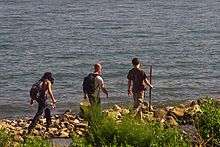
- Hiking - Israel is a great place for wilderness backpacking, hiking and camping. A large variety of forest, desert, mountain, and coastline landscapes are all close together, close to cities and historic sites. Keep in mind the important guidelines.
- Israel National Trail – a marked leisure trail (hiking or cycling) covering 940 km from north to south.
- Jesus Trail – a hiking trail from Nazareth to Capernaum covering 65 km that connects major Christian sites in the Galilee.
- The Nativity Trail, The path that Joseph and Mary followed to get to from the Sea of Galilee to Bethlehem
- National parks and Reserves . Well maintained, brimming with beauty and history, these sites often come with interpretive material and maps in English and other foreign languages.
- There are about 75 national parks and nature reserves in Israel. The entrance fees are between ₪20-40 and most of the time are discounted for (international) students.
- Historic sites in Israel are heavily dotted with informational signs in Hebrew, English, and Arabic. This, in addition to the pamphlet you are given upon entering national parks, makes it easy to understand the significance of everything you see. In contrast to many other countries (Italy comes to mind) where signs are rare and you need to hire a tour guide to understand what you are seeing, here the sites are much more self-explanatory.
- Israeli National Parks are usually closed before 8 and after 16/17:00 (winter/summer), which gives the opportunity for a free and spectacular sunrise or sunset (like the recommended one in Masada).
- Archaeological digs - given how much history took place here, archaeology has been a national pastime of modern Israel (though less now than a generation ago). In the early years of the state, archaeologists like Yigael Yadin became political leaders, while leaders like Moshe Dayan tried their hand as amateur archaeologists. There are still plenty of things left to find in the ground, and visitors to Israel can take part in a current archaeological dig. The shortest option is two hours long, in the Temple Mount Sifting Project in Jerusalem. For a longer dig, try Dig for a Day in Beit Guvrin. There are also many organized archaeological digs where you can volunteer for a period of weeks or a semester - for a list see here.
- Rafting on the northern Jordan River
- Rappelling or offroading in the Negev
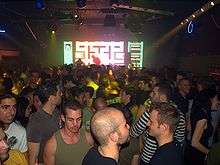
- Clubbing in Tel Aviv
- Skiing at the Hermon snow resort (open only in mid-winter)
Many Israeli website guides have an English version and can used for making plans:
- Tiuli - hiking and field trips
- Israel National Trail - Maps and other resources
- KKL-JNF
- Timeout - Digital edition
- TripAdvisor
Backpacking
Israel is not a big backpacking/hostelling country. It does not cater much to the independent traveller – sparse English information and signs (even at tourist sights), the lady at the cashier demanding from you to learn Hebrew, grumpy bus drivers (even Israelis say so), and (bus) displays in Hebrew and/or Arabic only are common. In addition, hitchhiking is not that common anymore (though still possible), which makes it hard and time-consuming for a traveller on a shoestring to save money.
Whereas in the West Bank or Jordan it is common to get a discount when turning up at an accommodation directly, in Israel only a few hostels appreciate such or direct bookings without using the monopolistic middle man. And you might even end up paying more when turning up out of the blue.
Many beautiful (nature) sites in Israel have been converted into national parks, which demand an entrance fee of ₪20-40. There is no combined park ticket available, which makes is it a quite steep fee if you plan to visit 10 or more over a couple of weeks. This makes it even harder for backpackers who are out in the open very often and just want to let themselves drift through the country.
However, besides those troubles, there are some great hikes and nature spots in Israel (even for free), and many free camping options if you bring a tent.
Buy
Money
|
Exchange rates for New Israeli shekels As of January 2019:
Exchange rates fluctuate. Current rates for these and other currencies are available from XE.com |

Israel's currency is the New Israeli Shekel (שקל חדש), ISO code ILS. It's denoted by the symbol ₪, placed left of the amount, a smush of ש for shekel and ח "hadash" for new. (Left of the amount is before it in English, after it in Hebrew.) One shekel is 100 agorot (singular: "agora" but as there are no coins of that value, you won't need that word). It's been the "new" shekel since 1986, so although the currency code NIS is still often used, the term "new" looks outmoded. There have been three banknote issues. Series A were all withdrawn by 2000, so if you're unlucky enough to be hoarding these, just stuff them in the Mogen David Edom charity box. Both Series B (paper notes from 1999) and Series C (plastic notes from 2014) circulate as legal tender. No date has been announced for withdrawal of the B notes, but traders look at them askance, and it can't be far away - offload them as soon as you can. The plural of "shekel" can either be "shekels" according to the English logic or "sheqalim" according to the Hebrew logic, but most Israelis will use "shekel" as the plural when casually speaking English.
Banknotes in circulation are ₪200 (new blue or old red), ₪100 (brown), ₪50 (old violet or new green), ₪20 (old green or new red).
 ₪200 - B-series
₪200 - B-series ₪200 - C-series
₪200 - C-series ₪100 - B-series
₪100 - B-series ₪100 - C-series
₪100 - C-series ₪50 - B-series
₪50 - B-series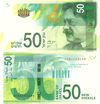 ₪50 - C-series
₪50 - C-series ₪20 - B-series
₪20 - B-series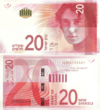 ₪20 - C-series
₪20 - C-series
As anywhere, paying with large notes for small charges will tick people off; hand-wave and mutter "slixha, slixha .. " profusely if not sincerely. The coins in use are ₪10 (bi-metallic; copper core, nickel rim, worth about 2 US$), ₪5 (nickel), ₪2 (nickel), ₪1 (nickel), 50 agorot (copper), 10 agorot (copper).
ATMs are available everywhere. Credit cards of all kinds are widely accepted. A Visa logo by an ATM does not guarantee that it takes all Visa cards; the ones with Chip-and-Pin technology seem to be only accepted by Bank Leumi ATMs (the rest use the magnetic stripe). Sometimes the ATM asks you for a 9-digit ID number (Israeli ID numbers are 9 digits); any arbitrary number such as 123456789 is reported to work with foreign credit cards.
You can get VAT refunds when leaving the country, though be prepared to queue at the airport. VAT refunds are only granted for individual receipts in excess of ₪400 and subject to a few other conditions. Eilat is a VAT-free city for citizens as well as for foreigners, but being a resort city it is often more expensive to begin with. See VAT refund guidelines at the Ministry of Finance website and consult the Israel Post website, which provides the refund.
US dollars are accepted in some tourist locations, particularly Jerusalem, at a rough exchange rate of ₪3.5 to the US dollar. If you are asked for dollars or euros outright, you are most likely being ripped off.
Costs
Living and travelling costs in Israel are almost on a par with Western Europe, North America and Australia, making it by far the most 'expensive' country in the Middle East region outside the Gulf area.
Small food kiosks (pitzutziot) offer various snacks such as freshly roasted peanuts, sunflower, and melon seeds, soft drinks, cigarettes and candy. The price of a soft drink can is between ₪5 and ₪10 and a 0.5L bottle is generally ₪1 more expensive than a can (July 2013). Prices in tourist areas in big cities, especially tourist cities like Eilat can be up to ₪20 per 0.5L bottle, however often a small walk will reveal the more local places that will sell you six 1.5L bottles for as cheap as ₪32. In fact, it is possible to buy a 6-pack of 2L "Ein Gedi" bottles for a preset price of ₪12.
For fast food, a shawarma in lafa should cost roughly ₪24-30 (drink not included), while a regular meal at a burger chain (McDonald's, Burger King and the local Burger Ranch) will set you back at least ₪35 —and there is no such thing as a "free refill" anywhere in the country.
Restaurants generally are in a high standard of taste and style, a first course averages ₪25–45 , a main dish about 50–100 (good meat can go from ₪80–150) and the desserts are usually ₪25-35. Soft drinks are somewhat costly and usually go for ₪10-12 for an average sized glass without refills. Bottles of wine in Israeli restaurants are generally very expensive, usually at ₪100–300 for regular wine.
Tipping
Outside of the food industry, tipping is not common.
Tipping in restaurants and bars is expected. In some Nargila (Shisha/hooka) bars there are also "security charges" that are not compulsory, but are added onto the bill; you then choose whether to pay these or not. This covers the cost of hiring an armed guard at the bar in the remote chance of attack. Israelis very rarely pay this, but tourists often do not realise it is not compulsory.
Israelis do not tip taxi drivers. It is conceivable that a less-than-honest driver might try to get you to tip, but such a trick would never work with a local.
- Restaurants - Tip 10%-15%. 15%-20% is considered a generous tip.
- Hotel staff - No tipping.
- Tour guides - 10% - 15% of the daily rate.
- Bartenders - Tip 10%-15%. 15% is considered a generous tip.
- Hair - No tipping.
- Moving - Tipping is optional, usually up to 5% (but often expected depending on the amount of work).
- Food delivery - Tip 10%-15%. 15%-20% is considered a generous tip.
- Groceries delivery - No tipping.
- Other deliveries - No tipping.
- Handymen - No tipping.
- Taxi drivers - No tipping.
Business hours
Israelis generally work five days a week, Sunday through Thursday. Friday and Saturday are considered the weekend, though schools are open Friday morning.
In Jewish areas, most shops are closed on the Shabbat ("Shabbat"), from sundown on Friday until sundown on Saturday. Shops are open Friday, but typically will close at about 14:30-15:00 to allow ample time return home before sundown, with some shops closing as early as 12:00. Many shops, especially in malls, will re-open on Saturday evening, at about 19:00 in winter, and 20:30 in summer. Some shops, especially outside city limits or in tourist areas, as well as 24-hour convenience stores, remain open on Saturdays. In Arab towns, shops are generally open 7 days a week.
Shops in malls and on major shopping streets are generally open 09:30-21:00 daily. Banks and post offices, as well as some smaller shops, stick to traditional business hours of 08:30-19:00, with a lunch break from about 13:00 to 16:00, so do check.
Markets usually open and close early.
Bargaining
Bargaining in Israel is prevalent, though less so than in the past. Unfortunately, it is sometimes difficult for foreigners to figure out when bargaining is expected and appropriate. A general guideline: Sales agents, high prices, or no displayed prices—bargain. Anything that looks established or corporate—don't. Although pushing through a bargain or requesting some freebies with communication companies (cell phone, internet, etc.) and the like often is a possibility!
Bargaining in bazaars and rural markets is common yet subtle. Vigorous bargaining which is common in developing countries will likely get you nowhere and is improper. If you are given a fair price, don't bargain for sport—it is frowned upon.
Bargaining in shops with sales agents is expected (for example, in an electric appliance store). Sticker prices are exaggerated for the purpose of bargaining. It is best to compare offers and figure out the true market price before purchasing. A common price comparison site is Zap.
Bargaining is improper in small mom and pop shops that sell low-cost items.
Bargaining with independent service providers (technicians, plumbers, movers, handymen) is common. It is not with non-independent service providers (hired employees).
In shops with displayed prices where you are not dealing with a sales agent bargaining is improper and will get you looks of bewilderment. This includes corporate shops (e.g. McDonald's), most stores in malls (without sales agents), and pretty much all businesses a tourist interacts with (with the exception of travel agents): accommodation, transportation, food (including food stands in markets). Some entertainment venues and most activity operators (especially extreme sports) can give you quite a sizable discount if you only ask.
If you are bringing a large group of people to a club or a bar, it may be possible to negotiate a discount before arriving with the group. If you are already there, bargaining won't get you anything substantial.
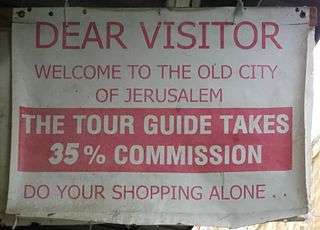
Prices in tourist traps such as the Old City of Jerusalem can routinely be haggled down to as low as 25% of the asking price. Usually it's easier to make a deal if you are buying multiple items rather than a single item. Be sure to go shopping on your own, otherwise going with a guide will inflate prices, because they usually demand commission from the (shop) owner for bringing tourists to shops, restaurants or sights.
When buying larger items (e.g. electronics), it's often possible to get a discount of about 3% for paying in cash, and additional discount depending on your haggling abilities.
Bargaining with taxi drivers over fare is possible, though rarely to your advantage. It is best to instruct them to use the meter (moneh) if they don't already do so as required by law.
You can ask for a discount ("yesh hanacha?" - "Is there a discount?") or bring in a coupon you found on an online coupon site.
Souvenirs
Israeli wine, kosher products, t-shirts, diamonds, ancient-style oil lamps. Needless to say, Israel is one of the best countries for purchasing Judaica and Christian pilgrim trinkets.
While it is legal to purchase antiquities from the small number of government-licensed dealers, exporting antiquities from Israel is strictly illegal, except with a written authorization from the Israel Antiquities Authority.
Eat
While many popular dishes in Israel are typical to the Middle Eastern Cuisine, its cuisine is as diverse as the population. Food is generally of a very high standard, and immigrants from around the world brought almost every genre and type of food to Israel. Kosher food is widely available. Even restaurants without Kosher certificates follow some guidelines of Kashrut to some extent. Tipping is very common in sit-in places that have waiters - not tipping in sit-in restaurants is frowned upon, but is accepted for signalling atrocious service. It is standard to give 10%-15% (or more for exceptional service). 20% tip is considered generous. Including a service charge in the bill is no longer legal in Israel and should not be paid. Restaurants may charge a "security fee" - roughly ₪1-2 per person. However, this fee is not mandatory, and it is common to ask for the fee to be removed from the bill, as well you should. Most restaurants accept credit cards, but do not accept personal checks. If you wish to include the tip in your credit card charge, state this before paying. Restaurants are required to allow this.
Perhaps surprisingly, items that are typically associated with Jewish cuisine in much of the English-speaking world such as bagels and pastrami are not widespread in Israel, though they can still be found in eateries operated by American or Canadian immigrants.
If you need an English menu, ask for a "tafrit b'anglit".
Fast and popular

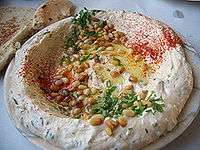
Israelis tend to consider usually falafel and hummus as national dishes, although these dishes do not originate in Israel. A serving of Falafel includes falafel balls, which are small fried balls of mashed chickpeas and/or fava beans, usually served inside a pita bread (or its larger cousin, the lafa bread) with hummus-chips-salat (hummus, French fries and vegetable salad) and tahini. A selection of more salads is usually available, and you can fill your pita with as much as it can take. This is usually the cheapest lunch available (₪10-15), and it's vegetarian (and often vegan). You can also order half a serving ("chat-TZEE mah-NAH"). If you don't know which falafel joint to go to, pick one with a good flow of customers, because falafel balls are tastiest when extremely fresh. Hummus is a popular dip made of chickpea granules and various additions (such as olive oil, fresh garlic, lemon juice and tahini) and usually eaten with pieces of pita. At places that specialize in Hummus (commonly referred to as "hummusiot"), you can find the dish topped with chopped lamb, fried chicken breast, and many other different toppings, such as cooked masabacha grains, shakshuka, ground beef, pine nuts, fried onions, mushrooms, etc.
Another popular option is shawarma - sliced turkey or lamb meat, also served inside a pita/lafa with hummus-chips-salat toppings. Many other things can fit your pita: for example, Me'orav Yerushalmi (Jerusalemite mix), which contain several types of offal meat, or schnitzel, a batter fried chicken breast somewhat inspired by the Viennese original.
Another street food gaining popularity is the Iraqi-origin sabikh: a pita bread stuffed with a hard boiled egg, batter-dipped deep fried eggplant, hummus, tehini, potatoes, and salad.
Dietary restrictions
Kosher food

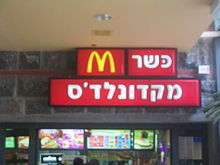
Israeli cuisine is heavily influenced by the ancient Jewish laws of kosher food. The word kosher means anything that is allowed by Jewish religious laws, in this case food laws. Among other things kashrut requires complete segregation of meat and dairy foods, dishes and utensils; select types of fish are kosher but most 'sea foods' are not; meat must undergo a ritual slaughter process; and all foods must be prepared under controlled and monitored conditions. Kosher restaurants and hotels display a valid, dated certificate issued by local rabbinical authorities; kosher restaurants close for the Shabbat. Because of the meat-and-milk restrictions, kosher restaurants bill themselves as either בשרי (b'sari, "meat") or חלבי (chalavi, dairy). Dairy restaurants will also serve fish (as Jewish law does not consider fish to be meat), and egg products. If you find cheeseburgers or pizzas with meat toppings in a kosher restaurant, they are made from soy or other substitutes for either the meat or the cheese.
Due to the secular nature of much of Israel, both kosher and non-kosher foods and restaurants can be found. Restaurants in Arab areas rarely follow kosher laws (unless they cater to a mixed clientèle), though they often follow Halal laws (the Muslim equivalent).
Most hotels in Israel are kosher, so breakfast is dairy, and during lunch and dinner you'll not be able to get milk for your coffee or butter for your bread (although soy milk and spread are common substitutes). Most big supermarkets sell only kosher products, but more and more non-kosher supermarkets and convenience stores have appeared, due in part to the many secular Jews who have immigrated from the former USSR. With restaurants, things vary by location: in Tel Aviv a large proportion of restaurants are non-kosher, while in Jerusalem nearly all restaurants are kosher. Restaurants that remain open on Shabbat cannot receive kosher certification. So some restaurants serve kosher food while not being certified, but not every restaurant that claims this is necessarily telling the truth.
One attraction for practising Jewish (and other) tourists is the kosher McDonald's restaurants. Most of the branches are not kosher, so ask before ordering. Branches of Burger Ranch, an Israeli burger chain, are kosher. Pizza Hut branches in Israel are kosher, and thus will not serve pizzas with meat toppings, while Domino's chains are not kosher, and serve a toppings selection similar to their Western branches.
One pitfall with finding kosher food is that some con-men have found they can make money by selling fake kashrut certificates. Therefore, someone looking for kosher food should look for a certificate from the local rabbinate or a recognized kashrut agency. Certificates from unknown organizations should not be relied upon.
The word for kosher is pronounced kasher (כָּשֵר) in Modern Hebrew, while the Hebrew word for "fitness" is Kosher (in Israel, gyms are known as kheder kosher, i.e. fitness room). The words have the same root - kosher food is food that is "fit" to eat for religious Jews.
Dietary restrictions during Passover
Another series of strict restrictions come into force during the seven days of Passover, when leavened bread (Hametz) — taken to include any grain product that may have come into contact with moisture and thus started fermenting — is banned. The religiously defined limit is 18 minutes. Any grain product that's come into contact with water for more than 18 minutes is considered "hametz". Some Jews even widen the ban to cover rice and legumes. The main substitute for the bread is matza, the famously dry and tasteless flatbread, and you can even get a matzoburger from McDonald's during Passover.

Religious sectors will completely remove Hametz from their properties. Because the restriction is only for 7 days, many shops don't remove Hametz from shelves and vending machines, but only cover them or visually hide them. In more observant shops, cashier machines will not recognize the Hametz products during passover, so it'd be hard to purchase them even after they are un-hidden. Note that as hametz owned by Jews must be nominally sold to a non-Jew before the holiday and cannot be repurchased on the Sabbath, many restaurants that are normally open on Shabbat will be closed the day after Passover when it falls on a Saturday, or will continue to serve their Passover menu.
Prominent local snacks
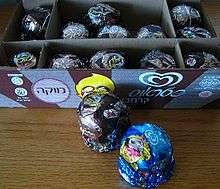
- Krembo (A hybrid of the words KREM and BO, "Cream" and "In it", respectively). A favorite Israeli chocolate snack. It is composed of a round cookie, on which cream (most often vanilla-flavored, but there is also a mocha variety) lies, covered with a chocolate shell. Krembos come wrapped in aluminum foil, and are very delicate. They are rarely found in the summer due to their tendency to melt in hot weather.
- Bamba. A popular peanut butter-flavored snack which is one of the leading snack foods produced and sold in Israel. Israelis have low rates of peanut allergies, because they eat Bamba as kids.
- Bissli. A popular wheat snack sold in various flavors such as onions, Falafel and barbecue.
Ethnic food
Jews immigrating to Israel from different parts of the world brought with them many different cooking traditions. Most of these are now served in a handful of specialty restaurants, so check the individual chapters and ask around. Among the selection: Ashkenazi (Eastern European Jewish), Bulgarian, Turkish, North African, Iraqi, Iranian, and many others. One can also enjoy excellent local Arab cuisine served in areas with large Arab populations, mostly in the north of the country and in the vicinity of Jerusalem.
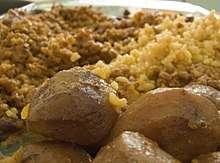
One dish, however, is known across nearly the entire Jewish Diaspora. Known in Europe as Cholent and in the Middle East and North Africa as Chamin, it is a sort of stew that has simmered for many hours over a low fire. It is traditionally a Shabbat dish, originating from the prohibition on lighting fire and cooking on Shabbat. The exact ingredients vary, but it usually contains meat (usually beef or chicken), legumes (chickpeas or beans) and\or rice, eggs, and vegetables such as potatoes, onions, and carrots. Chamin is served in some restaurants on Saturday, and can be bought in delicatessens on Friday.
Most Israelis enjoy instant coffee and will order it in restaurants and shops. The quality of this coffee is often quite high. However, Israelis also appreciate a café culture. While concoctions such as "botz" (mud) coffee, also known as "cafe turki" or Turkish coffee (an inexpensive extra-finely ground coffee, often spiced with cardamom, that is cooked on a stove and served unfiltered/unstrained) are popular, the coffee culture in Israel has become refined and the quality has drastically increased in the last couple of decades. High quality espresso has replaced instant coffee as the base of most coffee drinks. There are several highly popular local coffee chains and numerous independent coffee shops. Many Israelis like to just spend time sipping their café latté (the most popular coffee in cafés) and chatting with friends. You can also have a light meal with sandwiches and salads. Aroma is Israel's largest coffee chain that has good coffee. You can order sandwiches there in three sizes and choose from three types of bread. Arcaffé is slightly more expensive, but their coffee (some say) is a little better. Other chains include Elite Coffee, cafe cafe, Coffee Bean & Tea Leaf, and Cafe Hillel (of which some branches are Kosher dairy). Israelis frown upon US-style coffee, and Starbucks failed miserably in Israel because their coffee was considered inferior by the locals.
Vegetarians and vegans
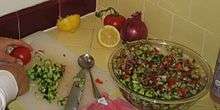
Vegetarians and vegans should have a relatively easy time eating in Israel. Due to the kosher law against mixing meat and milk, there are many "dairy" restaurants that serve no meat, which makes them popular with vegetarians. Be aware that these often serve fish. In some parts of the country you can also find vegan restaurants. Amirim is a vegetarian/vegan village in the Upper Galilee with several restaurants. "Israeli Salad" (sometimes called Arab or Chopped salad) is a chopped salad of finely diced tomato and cucumber. It is very common and can be found virtually in every food-serving establishment. It is common for sit-down restaurants to indicate on their menus which dishes are vegetarian, vegan, or gluten-free.
Drink
Alcoholic
The drinking age in Israel is 18. Drinking and driving is illegal and actively prosecuted. Also, since 2010, the sale of alcohol outside of bars and restaurants and public drinking are prohibited between 23:00 and 05:00.
The most active nightlife can be found in Tel Aviv and Eilat. Tel Aviv, "the city that never sleeps", is Israel's party capital with a vast number of bars and clubs. Compared to much of Europe, drinking is rather expensive and the steep prices in Tel Aviv in particular are sometimes cited as a reason for the rather large community of young Israeli expats in Berlin
Beer
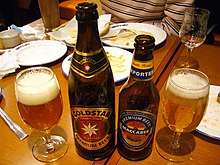
There are three main brands of Israeli beer:
- Goldstar. a Munich-style dark draught, it is the most popular Israeli beer in Israel. Can be found in bottles and cans of 0.5 and 0.3 liters (1 pint and half a pint, respectively), or KHE-tsi and shlish (Hebrew for "half" and "third". Referring to the amount based on litres, as Israel uses SI). It is also available from tap (meh ha-kha-VIT, Hebrew for "from the barrel"). Some say it pairs deliciously with Bissli, a snack food indigenous to the area.
- Maccabee. A pilsener, lighter and smoother than Goldstar. Comes in bottles, cans or from tap. This beer has a bad reputation in Israel as being of foul taste. Its recipe has been changed and the beer has been regaining popularity in Israel. Still, due to its bad reputation many bars do not serve it. The local variety of Maccabee tastes differently than the exported one.
- Nesher. comes in bottles, mostly malt.
Palestinian beers are also available:
- Taybeh. – made in the first micro-brewery in the Middle East, "Taybeh Beer Brewery" is from Taybeh village, a short taxi ride distance from Ramallah, an extremely fresh and delicious beer that is popular with many Palestinians, Israelis and tourists alike. It is mainly found in Israeli Arab communities, Jerusalem, and Palestinian cities. Taybeh Brewery offers free tours of the facilities and has ₪5 beers for sale at the brewery. Taybeh village also hosts its very own Oktoberfest-style beer festival held annually during the first week of October. The festival well-attended with foreign tourists and is growing in popularity.
Lately, several brands of micro-breweries have established themselves, and a wide selection of boutique beers such as Sins-Brewery, Bazelet, Golda, Laughing Buddha, Asif, Dancing Camel and many others can be found in selected alcohol houses and in some chain retail stores.
In addition, a wide variety of international brands are available throughout Israel, some of which are locally brewed. Among the most popular are Heineken, Carlsberg and Tuborg.
Liqueurs
A common liqueur in Israel is Arak. It is clear, and anise-flavored, quite similar to Pastis or the Colombian Aguardiente. It is usually served in a glass of about 0.3 L, mixed with equal amount of water and ice leading to a characteristic milk-like opaqueness. Some like to drink it mixed with grapefruit juice. Arak is usually kept in the freezer. A common brand is called Aluf Ha-Arak and Elit Ha-Arak (both of the same distillery) with the former of higher alcohol per volume and the latter of stronger anise flavor. They are of slightly different volume although the price is accordingly different.
Wines
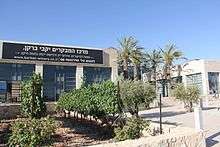
There are several local big vineyards and a growing selection of boutique ones, some of them of high quality. Wine is mentioned in the Torah and Israeli winemaking tradition goes back to before the Roman conquest. Much of Israeli wine is kosher. Kosher wine has historically had a terrible reputation that is mostly unjustified in the 21st century and has been fading due to the good quality of many kosher wines becoming more widely known among connoisseurs and the wider public alike. The Golan Heights are among the premier wine growing regions under Israeli control.
Soft drinks
Most of the regular Western soft drinks are available, and many have local variants that aren't very different in taste. The Coca-Cola Company, RC Cola, and PepsiCo fight for the soft drink market aggressively. Israeli Coca-Cola is thought by Cola connoisseurs to be tastier and more authentic than elsewhere, because it is made with sugar, not with high-fructose corn syrup. Tempo (not to be confused with Tempo Industries, Ltd. which is the brewer of most Israeli beer and bottler of most soft drinks including the local Pepsi) and Super Drink are dirt-cheap local variants, at times sporting very weird tastes.
The generic name for Coke or Pepsi is "cola", and it usually implies Coca-Cola; if the place serves Pepsi, they will usually ask if it's fine. "Soda" generally means "soda water", and is not a generic name for carbonated soft drinks.
There are several more authentic soft drinks:
- Tropit – cheap fruit flavor drink which is usually grape. Comes in a tough aluminum-like bag with a straw. The bag is poked using the straw to make a hole through which you drink. A very portable drink (until holed), which has become very popular in summer camps. In the newer varieties there is a marked area where the straw should be inserted. Even then it can sometimes take practice to insert the straw without the juice squirting out, if you are from the US it is just like the Israeli version of "Capri Sun."
- Chocolate milk – there are a number of brands of sterilized chocolate milk (SHO-ko) which comes in plastic bags and small cartons. The tip of the bag is bitten or clipped off, and the milk is sucked out. As with Tropit, it is very portable (although due to its milky nature, not as much) until opened, after which it is impractical to reseal. Chocolate milk in a bag is usually served cold, and it would be a very bad idea to warm it.
- Spring Nectar – fruit flavored drinks that comes in cans or 1.5L bottles. Sold in most supermarkets, convenience stores and petrol stations, as well as many take-away stands. Comes in a number of flavors such as peach, mango, and strawberry.
- Prigat – fruit flavored drink that comes in plastic bottles. Is sold at pretty much every supermarket, petrol station and corner-store around Israel. Comes in many flavors including grape, orange, apple, tomato and a few more exotic options as well.
- Primor – fruit juice in plastic bottles. Sold pretty much everywhere. Comes in many flavors, mostly citrus and apples.
Sleep
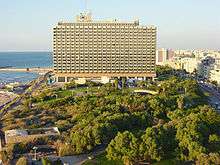
Israel is host to a huge variety of accommodation options, from camping and hostels through to 5-star luxury hotels. Accommodation in Israel is similar to Western standards in general both in terms of price and what you can expect as service. Hotels in Israel do not have star ratings, so beware that where these are seen, they are awarded by the hotels themselves.
Hostel/hotel owners in Israel do not appreciate it when you turn up onsite and ask for the best price leaving out the monopolistic middle man. Hence, you should instead book online (through their website, or one of the many commercial websites) or by phone, and take the best price you can get. Also, accommodations seem to use confusing US$ quotes and then demand shekels on purpose to prevent comparability. Make sure to always get the shekel (NIS) quote and demand to pay what was agreed on in shekels.
There are many free camp grounds available in Israel, especially in the Negev, which offer a great alternative to save some money. Most of the time you won't even need a tent, because rain and mosquitoes (and such) are sparse in the Negev.
Further remarks:
- Israel Hostels (ILH), a network of 40 independent hostels, guest houses and lodges designed for independent travellers. They hand out visiting cards you can use at the next ILH to get 5 % discount, so ask for them. Even so, make sure to confirm the price beforehand by calling or online, the quoted prices from their website/flyers do not always seem to be reliable.
- Israel Youth Hostel Association (IYHA) runs a thriving network of youth hostels, but is generally more expensive than the former one.
- The Israel Hotel Association (IHA) is the umbrella organization for Israel's hotels and also represents them. About 350 hotels, from Metulla in the North to Eilat in the South, are members of the IHA.
- A large number of kibbutzim now include bed and breakfast accommodation among their activities.
- A number of private residencies (popular in northern communities) offer a room to let (commonly known as "zimmer", from the German word for room).
- Israel has a number of 3-4 star hotel chains.
- Israel has a large number of boutique hotels and one large chain of boutique hotels, Atlas Hotels
- In the Negev Desert, there are multiple Bedouin camps that offer shelter and an unforgettable desert experience. You may be able to ride a camel, depending on the camp.
- Due to a Jewish religious prohibition on couples sharing a bed during certain periods in the woman's menstrual cycle, most king-sized beds at hotels are actually two smaller beds pushed together, which can be separated if necessary. It is therefore possible for two travellers who are not in a romantic relationship to book a room with one king bed if nothing else is available, then separate it into two separate beds.
Learn
Israel has many universities which tend to be well regarded by the international community. Special programs for students from abroad are offered by the Rothberg International School at the Hebrew University in Jerusalem, the Lowy School for Overseas Students at Tel-Aviv University and the Ginsburg-Ingerman Center for International Student Programs at the Ben-Gurion University of the Negev in Be'er Sheva. Also the Technion in Haifa and Recanati International School in the Interdisciplinary Centre in Herzliya offer international programmes for foreign students.
The International School for Holocaust Studies at Yad Vashem in West Jerusalem also offers a variety of educational options relating to the Holocaust or you could also use your time in Israel to study Hebrew. Hebrew school is called Ulpan (pl. Ulpanim).
There are even ways to learn Hebrew online from outside Israel - try Hebrew Online Guide, or Virtual Ulpan if you want some basic background for free. A good starting point for finding more information on study and volunteering programs, can be found on the website of the World Zionist Organization {.
If you are interested in learning firsthand about the social, political and cultural aspects of life in Israel, there are several programs and organizations offering courses, workshops or learning tours, such as: The All Nations Café in the Jerusalem - Bethlehem area.
Work
One of the iconic activities in Israel is working ("volunteering") on a collective farm: a kibbutz or a moshav.
Another popular option is to volunteer for work on an archaeological excavation, mostly conducted in summer at a variety of locations. Most Israeli excavations offer college/degree credit for international students.
While working on a tourist visa is illegal, if you stay at any cheaper hotel in Tel Aviv or Jerusalem, the staff may offer to put you in contact with opportunities to wash dishes or work in construction. Pay is only around US$7 an hour, and if caught, you can expect to be deported and blacklisted from the country for a period of no longer than one year.
Stay safe
|
What to do when a rocket siren sounds A rising-and-falling siren alarm is activated after detecting that rockets have been fired towards Israel. Israel's "Iron Dome" launches missiles to intercept incoming rockets, but only when they are headed toward populated areas. Also, it is not 100% effective, and even when it registers a "hit" it creates shrapnel which eventually reaches the ground. Therefore, when a siren sounds, you must take cover in a shelter. If there is no nearby shelter, head for a building, and place yourself as far as you can from windows, or other fragile objects near the windows. If no building is nearby, lie down on your belly and put your hands on your head. Make sure to check the calendar for memorial days, when a commemoration siren is heard on 10:00 for 2 minutes during Holocaust Remembrance Day, and on Yom-Hazikaron on 20:00 for one minute and on 11:00 for two more minutes. Commemoration sirens don't rise and fall. In general, behave the way others around you do. |
Emergency phone numbers:
- Police (mish-ta-RA) — 100
- Ambulance Service ("Magen David Adom"-MADA, literally "Red Star of David") — 101
- Fire department (me-kha-BEY ESH) — 102
Particularly when there is no fighting on the Lebanese or Gazan borders, travel to Israel is quite safe, and crime rates are well below those found in most other Western countries. Having said this, buses and bus stops have been targeted by Palestinian bombers since the early 1990s, though this became unusual after construction of the West Bank security barrier was initiated in 2005. Some Palestinians have deliberately driven cars or other vehicles into crowds waiting for the Jerusalem Light Rail, for example. However, statistically, the chances of being involved in a traffic accident are much higher than the chances of being involved in an attack.
It is still a good idea to stay informed of developments before and during your stay. Caution should be used particularly in the West Bank, East Jerusalem, and areas surrounding the Gaza Strip (particularly the cities of Sderot and Ashkelon, which have been targeted by rockets from the Strip). If you see anyone acting suspiciously, or find an untended parcel, notify the police. Also, never leave a bag unattended in a public area, as it may be suspected as a bomb.
Police in Israel wear light blue or very dark navy clothing with flat caps, while Israeli Border Police (similar in function to Gendarmerie) wear dark grey uniforms with green berets or police ball caps. It is not unusual to see plenty of soldiers (and sometimes civilians) carrying firearms (military rifles and handguns) in public. Most of these soldiers are simply on leave from their base. Soldiers have no authority over civilians, except in specially designated zones near borders or military bases, where they are allowed to detain you until the arrival of a police officer.
In terms of typical crime, Israel is a very safe country with one of the lowest crime rates in the world. You can walk around the cities and towns at night without fear, as mugging and drunken violence are rare. Single women should still take care late at night, but the risks here are far lower than practically anywhere in Europe and America.
It is very common (even required by law) to see private armed security guards at every public doorway (for malls, stores, restaurants, etc.). The guards ask to look in your bags and may use a metal-detector on your body. When entering underground parking lots, the trunk of your car will be inspected. Do not be alarmed: this is just national policy. If you carry a huge backpack, you can often get away with showing a passport, and the guards will be just as relieved as you.
Israel's relations with its neighbors should always be something that a traveler should be familiar with, as evidenced by the Israeli–Lebanese conflict of 2006. Despite the current ceasefire there remains a low danger that the conflict will again erupt. Israel has stable relations with both Egypt and Jordan, with which Israel signed a peace treaty in 1979 and 1994, respectively. The frontier between the Israeli-ruled part of the Golan Heights and Syria has also generally been quiet since 1974, but there have been attempts by Hezbollah to place missile batteries in the Syrian-controlled part of the Golan Heights, and some stray rockets from the Syrian civil war have hit the Israeli-controlled part of the Golan Heights.
Fighting and hostilities resumed in mid-2014 between Israel and Hamas Palestinian terrorists in the Gaza Strip, affirming that all travel to the Gaza Strip area should be avoided, and in the past several noted foreigners (even volunteers) have been kidnapped by armed militants during escalations. Israel does not allow travel to the Strip; the only way in is via Egypt. And even then, Egypt keeps the border shut most of the time. You might have better luck if you're a journalist, though.
Because of the Israeli-Palestinian conflict and Muslim-Jewish disputes over the status of the Temple Mount/Haram el-Sharif, violent clashes can sometimes break out in and around that holy place, and that these often include stones being thrown at Jewish worshippers at the Western Wall below. Check on current conditions before going to that part of the Old City of Jerusalem.
Hiking trails in southern Israel (and in the Golan) are adjacent to military fire practice areas. If you are not certain where you are going, do not hike in this region. These firing areas are marked on the official hiking maps.
On a similar note, especially near border areas, hiking or leaving the roadways, be aware of standing and/or fallen fences with a sign (yellow with a red triangle on it). These areas are considered off limits due to the possibility of land mines being present. They may have been planted by the Turks, British, Vichy French, Druze, Israelis, Lebanese army, Lebanese militias, PLO, or the Syrians (Golan Heights, Lebanese border). It could take another 100 years to clear out all those areas.
Gay and lesbian
.jpg)
Unlike many parts of the Middle East, homosexuality is legal in Israel. In fact, some gay rights advances happened in Israel earlier than in Western countries such as the US. Attitudes towards homosexuality will vary depending on where you go, but in general, Israel is considered safe for gays and lesbians, as violence is rare and open disapproval is mostly confined to certain parts of Jerusalem and/or religious neighborhoods.
All 3 major cities (Jerusalem, Tel Aviv and Haifa) have an annual "Pride" parade, and the annual Love Parade in Tel Aviv gets cheering spectators too. Though Jerusalem has an annual pride parade, it is not very common to see openly gay people in Jerusalem, and you should avoid openly showing your sexual orientation in most public places in Jerusalem or other visibly religious places. In general just try to avoid public displays of homosexual affection or conversation in a direct or suggestive manner in Jerusalem. While anything serious is unlikely to happen to you, it will draw stares and identify you as a "tourist" at the very least.
On the other hand, Tel Aviv is very liberal and gay friendly. It is common to see same-sex couples show affection in public areas. Tel Aviv was declared as the world's best gay travel destination for 2012 in a survey carried out by American Airlines and GayCities.com for good reason: there are many gay friendly places around the city, considered a stronghold of the gay community in Israel. Tel Aviv's nights are full of hundreds of passionate, energetic pubs, bars and dance clubs that are open till dawn. The city is active in all areas of entertainment, and is highly recommended for tourists looking for exciting nightlife in general, and exciting gay nightlife in particular. There is a reason for the old adage "Jerusalem prays, Haifa works and Tel Aviv dances" after all.
Stay healthy
Emergency phone numbers:
- Ambulance Service ("Magen David Adom"-MADA, literally "Red Star of David") — 101
There are no special medical issues in Israel, and no immunizations besides the common routine vaccines are necessary for travel here. Though rabies is not a major risk to most travelers, CDC recommends this vaccine for those involved in outdoor and other activities in remote areas that put them at risk for animal bites (such as adventure travel and caving). Hepatitis A and B vaccines may be needed also. Travelers to West Bank and Gaza should strongly consider getting a typhoid vaccine. One can get typhoid through contaminated food or water. Typhoid vaccine is not expected for travellers whose itineraries are limited to Israel.
Pharmacies and hospitals are available in all major cities and emergency and health care is to a very high Western standard. Pharmacists and all medical personnel speak adequate English. In Israeli pharmacies, the "over-the-counter" stuff is in fact over the counter. Ask the pharmacist if you need anything. Travel health insurance is highly recommended; although all Israelis are covered under the national health insurance system, foreigners will be expected to pay for any treatment received in the public hospitals or at a clinic.
Tap water is potable and perfectly safe for drinking all throughout Israel, big cities and rural parts alike. However, avoid taps that you might find within cultivated fields (e.g. while hiking); they may use recycled water which is only good for irrigation.
Street food is safe and clean, including fried dishes, fish and different salads. It still is wise to use common sense and avoid anything suspicious.
The hot climate in Israel is a major issue, especially at summer. Use sunscreen throughout your stay and drink a lot of water. See also sunburn and sun protection.
In desert and rural areas
Southern Israel desert region offers amazing hiking trails in a beautiful landscape that possesses some unique geographical features not available anywhere else in the world. However, if you are inexperienced in hiking in the desert, do not hike there without an experienced hiker, proper equipment and clothes, plenty of water, and taking the necessary precautions. Dehydration on hot days, hypothermia on cold nights, and flash floods on rainy days are serious dangers!
Cope
Foreign embassies
All foreign embassies are in Tel Aviv or in cities around it, and not in the capital, Jerusalem, because the rest of the world disputes Jerusalem's status as Israel's capital. However, a few countries including the United States of America have a consulate in Jerusalem that is responsible for the citizens of the country who live in the area.
Media
Newspapers
In English:
- The Jerusalem Post. A daily newspaper in English, published in Israel.
- The Times of Israel. A newer Jerusalem-based online newspaper published in English, Arabic, French, Persian, and Mandarin (Chinese), that doesn't have a printed edition.
Other major Israeli newspapers that have an English language section to their websites include:
- Ynet (Yediot Ahronot). Non-intellectual and left-wing.
- Israel Hayom (Israel Today). Non-intellectual and right-wing.
- Globes. Focuses on business.
- Haaretz. Intellectual and left-wing.
Other languages:
- Vesti (Russian: Вести). The most widely read Russian-language paper in Israel.
- Panorama (بانوراما).
- Al-Sinnara (الصنارة).
Local newspapers in other languages may be available where demand exists.
Radio and TV
- Reka. Radio station broadcasts in several languages, including English (20:00), French (21:00), Spanish (22:00), Georgian (12:00), Bukhori (12:30), Amharic (13:00, 19:00), and several programs in Russian. It can be received at 100.3MHz FM, 100.5MHz FM, 101.3MHz FM, 101.8MHz FM. Programs include local culture and news.
- i24news. an internet TV station with many broadcasts about Israel. It has an English feed, along with Arabic and French versions.
- Virtually all TV stations present all TV shows in their original language, along with Hebrew subtitles (sometimes with additional Russian or Arabic subtitles). The common exceptions are shows for young kids, which are dubbed to Hebrew.
- It is common to randomly find other Israeli radio stations broadcasting interviews and complete radio shows in English.
Respect
|
Israel is considered the home state and motherland for Judaism, and also contains places of pilgrimage for Muslims, Christians and Baha'is. When travelling to holy sites of any of the Abrahamic religions or going through religious neighborhoods or towns, please be respectful and wear modest clothing to respect the sensibilities of the local residents and the sanctity of holy sites. If you show respect, you will engender respect in return. |
|
Media Visitors to Israel are often surprised by the almost compulsive need of Israelis to listen to the news. Ecclesiastes may have stated that “There is nothing new under the sun,” but Israelis believe the opposite: they look forward to the news every hour on the hour out of a seemingly mystical belief that today is different from yesterday. This story could sum this attitude up. A few years ago the newly-appointed ambassador to Israel of a western European country presented his credentials to the president. After the brief ceremony, the two exchanged the usual pleasantries when the president suddenly looked at his watch, begged his guest's pardon, and turned on the radio on his desk. The ambassador waited patiently while the president listened to what was a news bulletin and turned the radio off. When the ambassador asked “What happened?”, the surprised president replied, “Nothing.”. The ambassador said, “I thought that if you turned on the radio, you must have a special reason,” and the president said, “No, it's a conditioned reflex. If I don't hear the news, I am uneasy for a full hour until the next newscast!”. However, this behavior seems to be decreasing now that most people have smartphones.... |
Israel is generally a very relaxed country with a western-oriented outlook, but in religiously charged settings, or when around certain types of religious believers (Jewish or Muslim), some restrictions should be observed. Entry to some synagogues, most churches, and all mosques will normally not be permitted to those with exposed legs (i.e. wearing shorts or short skirts) or women with exposed upper arms. Women may be denied entry or ordered to wear a robe before entering mosques or synagogues. Carry a wrap or bring a change of clothes. Mosques will also require you to take off your shoes before entry. Men should cover their heads in a synagogue, as well as in the prayers section of the Western Wall. Outside locations significant to religion, dress is very casual and free. Israeli women dress to impress, and usually succeed.
The Arab-Israeli situation is an emotional issue for many, as is the Holocaust/Shoah, as well as much of Jewish history generally. (One should be especially respectful to the Holocaust/Shoah as many Israelis are grandchildren of survivors, and most if not all of the Ashkenazi (European) Jews who make up 50% of Israel's Jewish population lost family members during the Holocaust.) On the other hand, most people, both Israeli and Arab, would be happy to answer your questions. In addition, one probably should not make disdainful remarks about Judaism toward observant Israelis nor the Quran for Muslims. It is very disrespectful and could create problematic situations.
Israelis sometimes compare themselves to the prickly pear or sabra: said to be tough and prickly on the outside yet sweet and soft on the inside. Israelis are direct in a way that might seem abrupt, even rude, in other parts of the world. Do not be offended by this as Israelis do not mean to insult or offend in any way. Directness and honesty are often valued over politeness and projection of niceness. Direct personal questions are common, and should not be taken as offensive. The information Israelis collect on you is meant to help you in a good way, not to set traps for you. Israelis are used to fighting for their right to exist and have to hold their own against the pressures of the family, religion, the army and other Israelis. Loud and heated debates and arguments are socially acceptable and should not be taken as a sign of hostility. Israelis are typically careful not to be perceived as a frier, often translated as "sucker", meaning someone who pays too much, stands in line quietly as others jostle past, and is generally taken advantage of instead of standing up for himself.
But Israelis are also very kind and hospitable. Strangers will gladly assist you, and make great efforts to help a lost or inquiring tourist, sometimes overwhelming you with advice and questions. If you make a friend here, they will do their best to take care of you while you're in their country. Foreign visitors are deeply appreciated and are generally shown the utmost respect by locals. Many will even go as far as to show you around some areas in Israel as a sign of their own national pride and respect for tourists.
On Holocaust Remembrance Day and Yom Hazikaron, sirens sound and the whole country comes to a stop and stand in respect for the victims. Visitors are expected to do the same.
Connect
By mail
- Surface mail. Postcards to Europe cost ₪3.20. This is still an option, even though many will try to make you believe the ₪7.40 airmail is the only option. However, just go to the post office and demand the ₪3.20 stamp. Be insistent and refer to the price sheet they have posted within the post office – there you will find the international surface mail option listed.
- Air mail. Postcards and letters up to weight of 100 g cost between ₪7.40 and ₪9, depending on the country of destination.
By phone
+972 is the international country code for Israel.
- 01x numbers are international access codes when calling abroad from Israel. also available "00", and "+".
- 05x numbers are cellular lines or mobiles.
- 07x numbers are for landlines operated by VoB and VoIP technologies.
- 0x2 numbers are used for Palestinian land lines.
When calling inside Israel, you can either dial the number exactly as listed in Wikivoyage from mobiles and many landlines or replace the "+972" part with a single leading 0. (In the first form, you dial the number without spaces and hyphens, optionally replacing the "+" symbol with the international access code; when the party being called is in the same country as the caller, the internationally-dialed numbers are looped back at the base station.) For example, when calling +972 2 345 6789 inside Israel, dial 02 345 6789 or +97223456789 as-is, or 0097223456789.
The allocation of dialing codes to particular companies may be inaccurate, since subscribers may keep their phone number even if leaving or changing their phone company. For example, new 050 codes are allocated to the Pelephone company, but users can switch carriers and keep their 050 number even when receiving service from the Cellcom company which is usually identified with the 052 code.
- 0x - Area codes – the 0x area codes are used for land lines operated by the national phone company -Bezeq. Other landline operators have distinctive area codes
- 02 - Jerusalem area
- 03 - Tel Aviv-Yafo and the center
- 04 - North
- 08 - South & Shfela
- 09 - Sharon
- 0x2 - Paltel (Palestinian operator)
- 01x - International access codes – If you want to phone home from Israel, you need to choose which company you want to use for your international call first.
- The '00' access code for international calls is available only on phone lines that chose, in advance, one of the long distance carriers as their preferred provider (so it's not available on pay phones).
- 012 - Smile
- 013 - Netvision
- 014 - Bezeq International
- 017 - Hot Mobile
- 018 - Xfone
- 019 -Telzar
- The 018 prefix is a VOIP operator. Thus, it has the cheapest rate but a somewhat lower line quality.
- 05x - Cellular carriers
- 050 - Pelephone (literally "miracle phone", the first cellular operator in Israel. "Pelephone" has became a generic name for cellular phone in Israel).
- 052 - Cellcom
- 053 - Hot mobile
- 054 - Partner (Orange)
- 055- MVNO (Mobile virtual network operators)
- 056 - Wataniya Mobile (Palestinian operator)
- 057 - Mirs (old network of "Hot mobile", numbers are in transition to 053 - the rest of the number is unchanged)
- 058 - Golan Telecom
- 059 - Jawwal (Palestinian operator)
- 07x - Countrywide landline codes
- 072 - 012 Smile
- 073-2/3 - Cellcom
- 073-7 - 013 Netvision
- 074-7 - Partner (Orange)
- 076-5 - 014 Bezeq international
- 077 - HOT
Some Israeli numbers have only 3, 4, or 5 digits and starting with a *. To dial those numbers you actually type in the number on a phone, including the *. For example, the number *8787 is used by the national public transportation information call center. These * numbers work depending on your operator, with most of the numbers supported in landlines, and partial support in cellulars. Usually when a * number is published, a longer number is mentioned somewhere in the footnotes. The longer number is also the way to dial the number when calling from a foreign international line.
Cellphone rentals and prepaid phone service
You can rent a cellphone for use in Israel either before your trip or once you arrive from several firms.
You can also rent smartphones with sim cards included sometimes for lower than the cost of renting just a sim card. This offers the advantages of a sim card rental without having to worry about bringing your own phone to Israel.
If you have a GSM cellphone without a SIM-lock, you can buy a SIM-card.
Prepaid SIM cards are available at Pelephone (Talk&Go), Cellcom (Talk Man), Partner (Bigtalk) and HotMobile, Rami-Levi phone stores throughout Israel. Almost all shopping malls will have a Pelephone, Cellcom or Orange kiosk or store. Local prepaid packages valid for a month with 30G of data and 1,000 minutes of local calls should cost less than a 100 ILS.
Prepaid websites in English:
Roaming with your own device
Israel offers support for all the available networks including GSM/UMTS (Pelephone, Cellcom and Orange), CDMA (Pelephone) and iDen (Hot Mobile, gradually being phased-out). In any case, you must check with your carrier about the roaming option and the compatibility of your device in advance. A valid suggestion otherwise is to turn off data services, especially any automatic update/download of your email. Otherwise you might get an unpleasant surprise on your next phone bill! Buying a local SIM card is easy from many kiosks near popular tourist sites, perhaps even your hotel.
Public payphones
There are many public phones scattered around, usually lacking a booth (just a phone on a pole). Public phones can be always found at hotels, post offices, central bus stations and train stations. These phones use a Telecard, which, today, is a pre-paid calling card (the scratch kind) that works only with pay phones and can be purchased at post offices and some stores (the original Telecard was phased out as the last factory that manufactured it was shut down), as well as ordinary calling cards. Some phones also accept credit cards, usually those in hotels and post offices. In Jerusalem especially and in more Jewish-religious areas you will find public phones to be very common, as the more religious Jews tend to frown on the new mobiles with Internet access, etc.
There is a map of public phones (click the Google link on the site), though it might be incomplete or out of date.
It is also possible to find privately operated pay phones that accept (outrageous) payment in coins and/or credit cards. Be warned that most storekeepers will produce their own phones (for the above-mentioned outrageous fee) when asked, in absolutely no relation as to whether there is a (much cheaper) public phone just 10 seconds away.
In general, if you go up to an Israeli waiting at a bus stop and ask "Efshar sikha?" ("Can I make a call?"), they are likely to let you use their phone. Most cell phone plans feature unlimited calling, so this does not cost them anything.
By net
Cellular internet is cheaper than in countries like the US, and it is recommended to use it along with your cell phone plan.
Free WiFi on buses and in cafés is common but not universal.
